#there's also reference to Russian fairytales
Text
was kind of wondering if anyone wanted to beta read Strings Theory? I've pretty much wrapped it up at around 111k words and just need a foreword and an epilogue which I'm planning to do a bit later. As a refresher it's sort of like a hodge podge of retold fairytales and motifs with a hard focus on specifically bengali fairytales mostly. Lgbt cast, anti-monarchal sentiment, and interesting imagery... Message me if ur interested in helping out

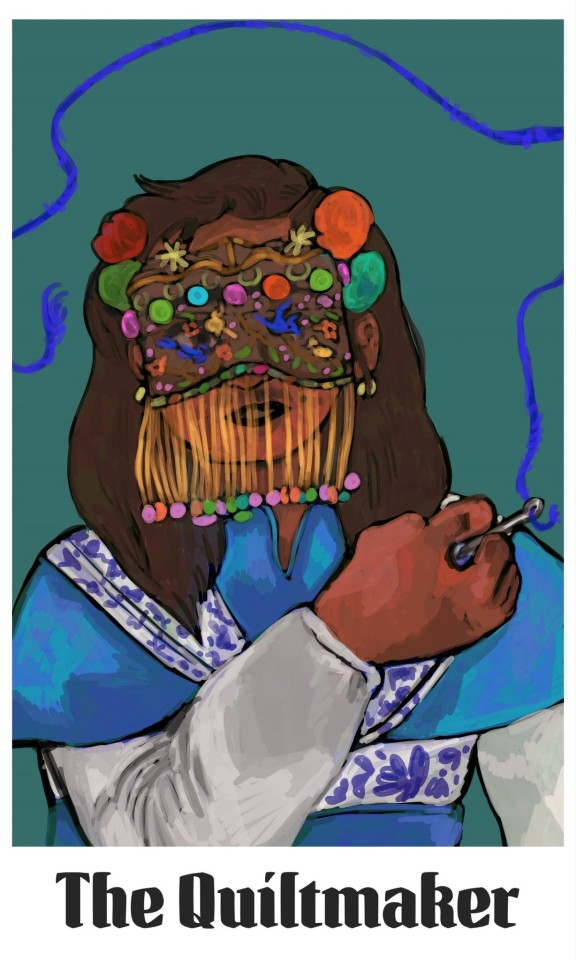

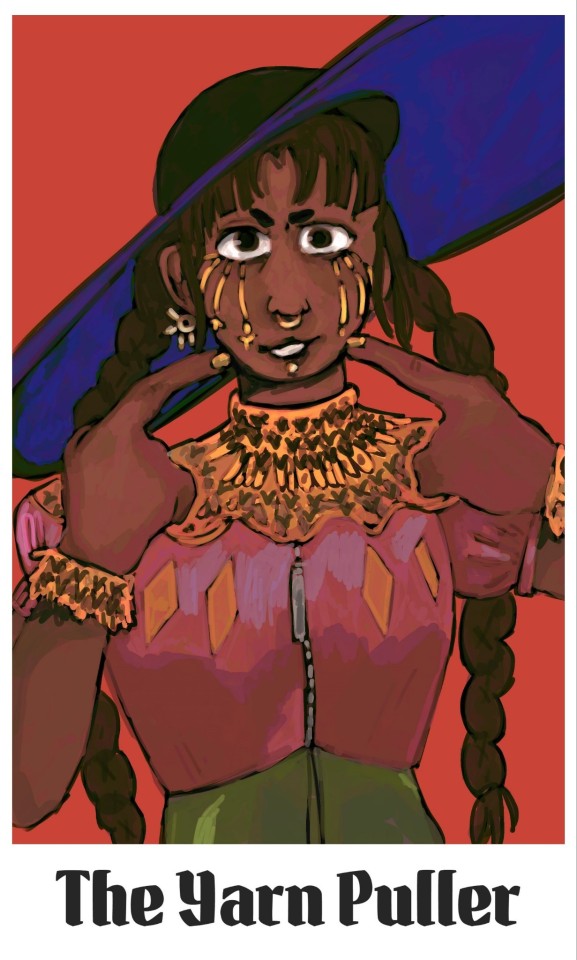
#there's also reference to Russian fairytales#I grew up with a bunch of those translated into bengali so idk how recognizable the references are but like it's there#Strings Theory#I'd love to get thoughts and feedback before I send it out to literary agents#Would love some input from some lovely people
42 notes
·
View notes
Note
do you know where the first few of the romanovs resided before all of the palaces were built and if so, are any of them remaining? do we know what they look like?
I'm afraid very little from the earliest days of the Romanov dynasty had survived the ravages of time. By the time of Nicholas II, many early residences had already been either destroyed or replaced by the modern and elegant palaces we see today. Here's a few that survived.
The Cabin of Peter the Great
May 1703
Built during the founding of the city of Saint Petersburg, the log cabin was the first St. Petersburg "palace" of Tsar Peter the Great. The small wooden house was constructed in just three days, by soldiers of the Semyonovskiy Regiment.
At that time, the new St. Petersburg was described as "a heap of villages linked together, like some plantation in the West Indies".
The Cabin was boarded up and camouflaged during the Second World War. It was the first St. Petersburg museum to reopen in September 1944, after the end of the Siege of Leningrad.
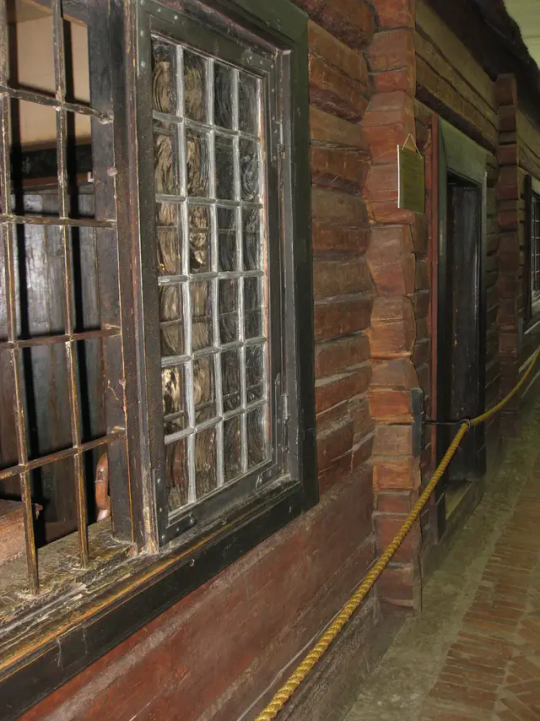

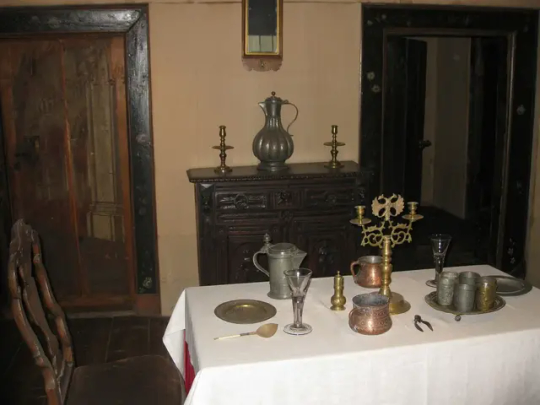
This cabin must have appeared as a huge downgrade after the wooden palace of Tsar Alexei!
The Wooden Palace of Tsar Alexei Romanov
1667
The recreation of an authentic mid-17th century Romanov residence was built recently in 2010. The Palace of Tsar Alexei Mikhailovich, also known as the Wooden Palace of Tsar Alexei, is a large wooden palace in Kolomenskoye, near Moscow, Russia.
The original was built in 1667 without using any fasten materials, nails or hooks. The wooden palace, famed for its fanciful, fairytale roofs, was a summer residence for Russian tsars before St. Petersburg was constructed.
The palace was divided into male and female halves, with the Tsar and Tsarevitches towers and chambers in the male half and the Tsarina's towers in the female half.
The palace's interior featured rich decorations, including carving, painting, gilding, and ceramic tiles, as well as rectangular and round stoves, weathercocks, and windows and porches.
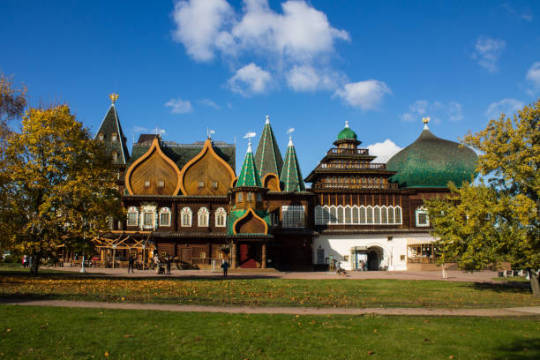
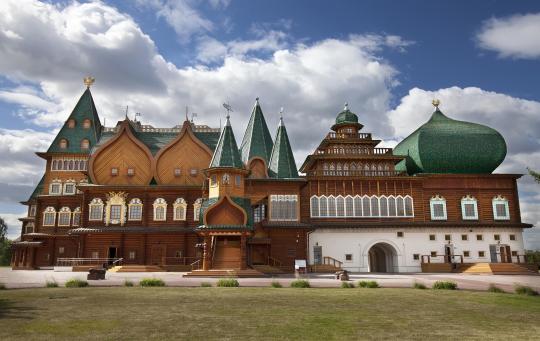
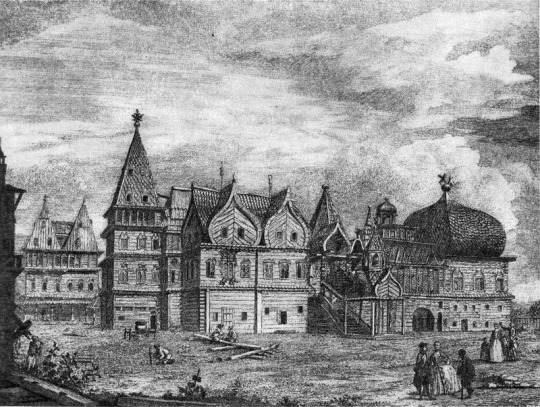
Foreigners referred to this huge maze of intricate corridors and 250 rooms, as 'an Eighth Wonder of the World'. Although basically only a summer palace, it was the favorite residence of Tsar Alexei I.
The future Empress Elizabeth Petrovna was born in the palace in 1709, and Tsar Peter the Great spent part of his youth here.
Upon the departure of the court for the swamps of St. Petersburg, the palace fell into disrepair, so that Catherine the Great refused to make it her Moscow residence. On her orders the wooden palace was demolished in 1768, but thankfully, the detailed plans of the palace had survived.
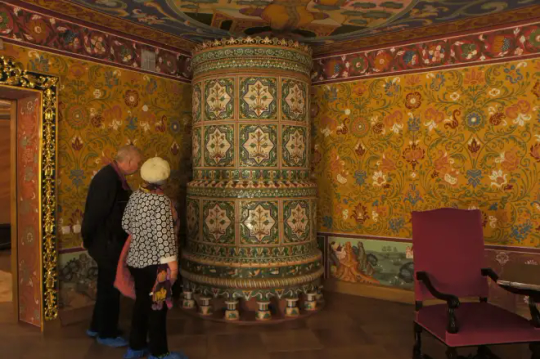
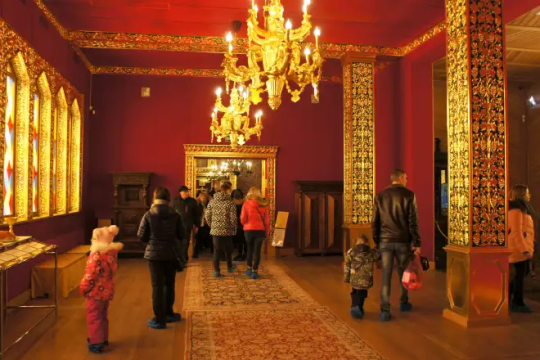

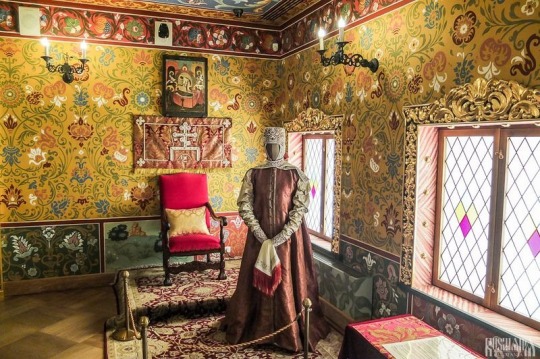

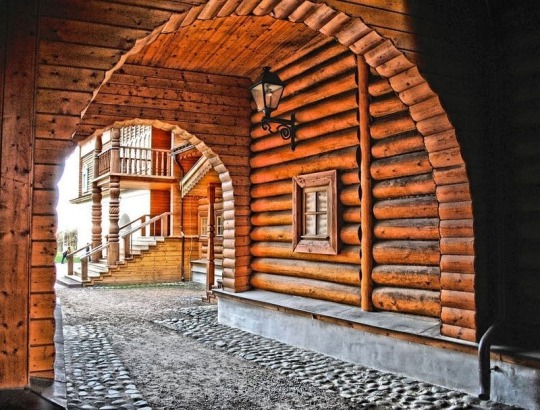
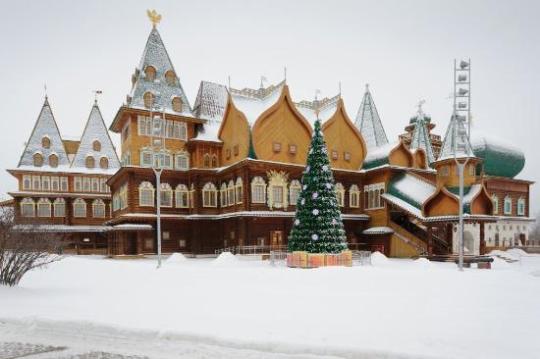
Summer Palace of Peter the Great
1714
One of the earliest imperial residences I can think of that still exists today is the modest Summer Palace of Peter the Great, which is located on an island near the Peter and Paul Fortress, the burial place of the Romanovs.
The palace was built between 1710 and 1714, a few years before the proclamation of the Russian Empire. By the time of Tsar Nicholas II's reign at the end of the 19th century, it became vacant.
During the Second World War, both the Summer Palace and Summer Gardens were badly damaged by a German bombing raid. The building was repaired, however, and the layout remains unchanged from the original.
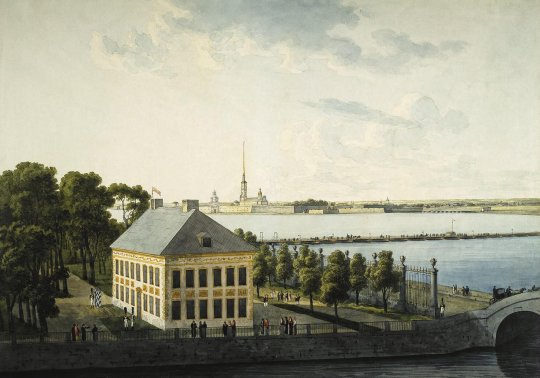
Above: The palace as depicted in 1809. Below: The residence today.
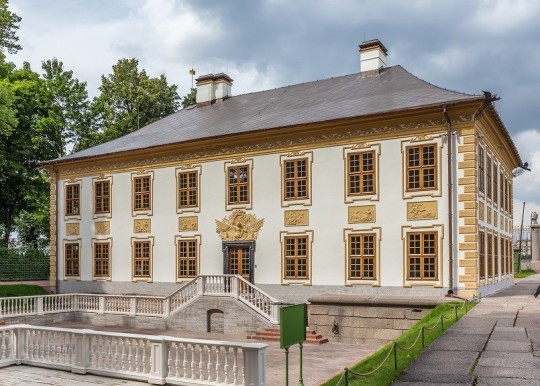

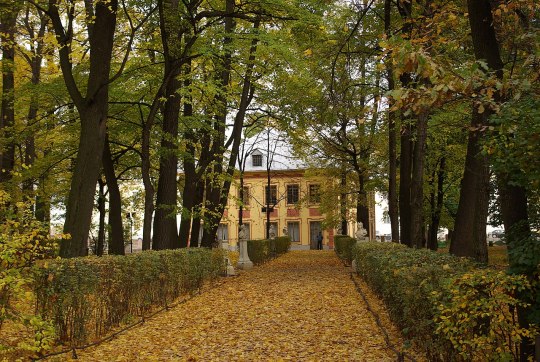
Monplaisir Palace in Peterhof
1714-1716
There is another residence owned by Peter the Great that is still standing today. And that is the Monplaisir Palace in Peterhof.
The following painting depicts the formidable Tsar and his son and heir Tsarevich Alexei Petrovich, who has been accused of preparing to seize power, in the interior of the Monplaisir Palace. Before pronouncing sentence, Peter I gazes into his son's eyes, still hoping to discern signs of remorse.

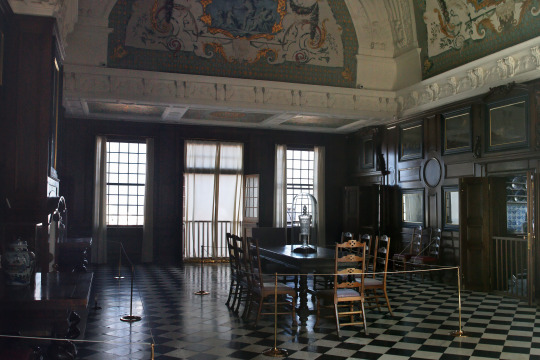
Above: The Parade Hall of Monplaisir Palace today.



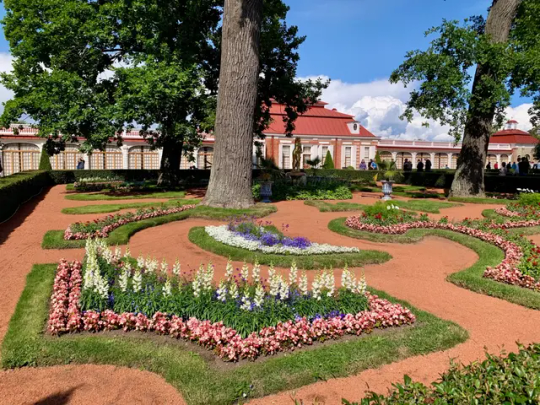
#romanov#romanovs#palace#palaces#history#russian culture#russian history#royal history#imperial russia#moscow#saint petersburg#peterhof#russian imperial family#ask
39 notes
·
View notes
Text
ROUND 2C, MATCH 4 OUT OF 4!
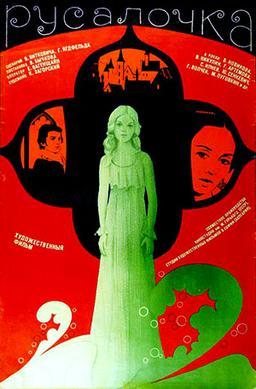
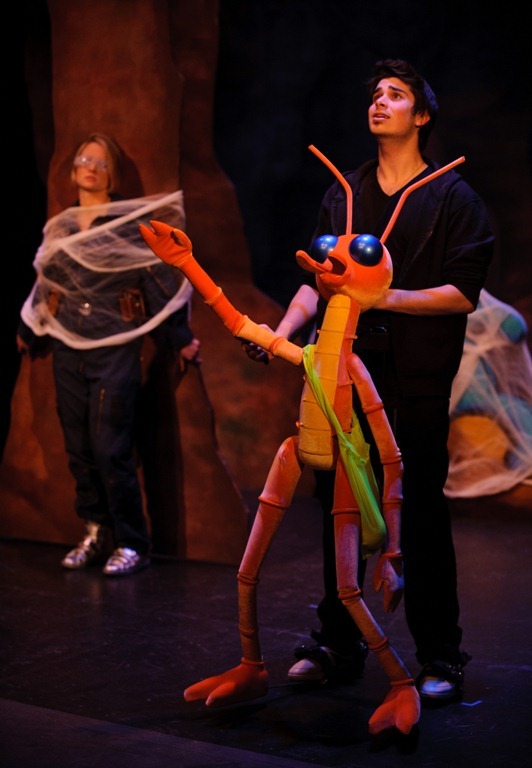
*Referring to the 1976 Russian live-action movie, Rusalochka in its original language.
Propaganda Under the Cut:
The Little Mermaid:
The actress is really cute!
Viktoriya Novikova is very cute with green hair
while probably not the most unique or interesting little mermaid, the costuming in this movie is so fun i love it
Bug:
Their a bug that falls in love with a human they rescue and becomes human, but even when they don't get to keep their human body, they still get to be with their love. It's a sci-fi fairytale musical.
Little Mermaid meets Starship Troopers musical starring awesome puppets and the most trans coded main character ever. Please. Please vote Bug Starship I love him. Go watch Kick it Up a Notch from Starship. Go watch Status Quo from Starship. You will understand.
He's a bug and he lives in space on a bug planet but he really wants to be a starship ranger which you can only be if you are a human and then one day a spaceship lands on his planet and so he goes to an evil bug called Pincer who then helps him become a human. And Bug falls in love with a human on the spaceship and it's very sweet. The musical and storyline are based on the little mermaid story, the creators themselves called it "the little mermaid but in space". Bug wanting to be a human/a starship ranger and achieving that and falling in love with a human is very much like the little mermaid
Starship is a musical that can only be described as The Little Mermaid meets Starship Troopers. It follows Bug, an alien bug who dreams of being a Starship Ranger, a galactic explorer/soldier, but the rigid confines of bug society keeps him trapped in a job he hates. He reaches a Starship Ranger named February from the hive and immediately falls in love with her. In order to be with her and pursue his dream, he makes a deal with a giant scorpion named Pincer who through sci-fi bs gives him a human body. Near the end of the second act he sacrifices his human body and returns to his bug body, and saves the day and wins February's heart. It's truly the ultimate Little Mermaid. He has multiple songs, and his bug body is portrayed by a puppet!! Vote for Bug!!
“It's a big, big, universe So many dimensions And unanswered questions Not to mention Life What an invention Life There's no choice involved in what you are given One mind, one voice, one body to live in It's a short, small thing we lead With so much potential Pointless or essential Which one can I be? Where do I fit? Where do I stand? Who are they to say what I am? And how can I stay inside this awful world I know? I need a way out I need an escape I'd rather be dead than to live in this place I wish that something or someone could just take it all away Someone take me away” dear god….. can anybody hear me…. (song from starship)
They are the purest little mermaid adaptation done in the most unuque way. An alien insect gets turned into a human, a race he has always loved and admired, to be with the woman he fell in love with. Also just a great musical.
Bug's whole arc is so so in tune with that of the little mermaid. He is an alien who has fallen in love with humanity through a crashed spaceship and trades his place in the hive for a chance to be with both with the human he's falling for and to be a Starship Ranger. He body swaps with human in a cryogenic pod! It's literally sci-fi Little Mermaid!
#the little mermaid#the little mermaid 1976#rusalochka#bug#team starkid#starship#starship by team starkid#little mermaid#fairytale#fairy tale#poll tournament#poll bracket#character polls#polls#round 2#round 2c#the little merpoll
45 notes
·
View notes
Text
Simon petrikov is Russian! And probably Jewish!
I’ve been wanting to say this since Simon was first introduced in the original show but honestly just never had time and I’m sure someone has said something before but here I go!
So starting out with the obvious: petrikov, a diminutive of petri or Peter, this is a very common Russian name which when used as a nickname means small or little.
Simon on the other hand is an incredibly popular Jewish name, being the second of the six sons of Jacob, and being the founder of the tribe of Simeon. The name it’s self meaning to hear or listen. Which I think personally fits Simon very well.
We also see reference to simon’s Russian heritage in Fionna and cake episode 6, the winter king. most notably with the samover and teapot that holds hot chocolate in the background.

There is also heavy Russian fairytale imagery in this episode as well as some themes that I won’t get into right now.
There are also themes surrounding the ice king that heavily lean into antisemitic tropes (not condemning adventure time for this) such as his long nose, beard, kidnapping people, and his greed. Ice king also mirrors several Russian fairytale wizards (no I can’t name them of the top of my head I’m sorry) who kidnap princesses, uses there beards to fly, and even some who have ice/lightning powers.
My sources are, I’m Slavic and grew up with the fairytales. and have done a lot of research into Judaism becase I’m pretty sure that my family was Jewish before coming over to America during WWll. (My g-pa is super racist and won’t talk about anything to do with his “non-white/christian” family. 😬
Anyways this is all I can come up with off the top of my head but I needed to get this out of my system before I exploded bye,
144 notes
·
View notes
Text
The Pathologic Russian and English analysis: Clara Saburova the Changeling Part 2
I am finally free to have a single month of summer vacation, so I'm taking this opportunity to finish up the last of the healer to healer communication analysis. Are you excited? I sure am.
As the Haruspex: I uhhh… Don’t have much to say specifically about the differences between Clara in Russian and English that I haven’t already said. Like yeah, she acts differently with Artemy than she does with Daniil, but that is present in both of the versions - she is much more vulnerable and emotive with Burakh, while she is a lot more deceitful with Dankovsky (which is sorta muddled by the fact that he’s the only one of the two to meet her "twin"). She refers to Artemy using exclusively the informal “you” and has a very stubborn and argumentative way of speaking for most of it. The instances of the “biblical” way of speaking that I pointed out in the Bachelor route are less frequent here, and Clara comes across as, well, just a girl. I uh… Also think that the dialogue website I’m using might be missing the bit of dialogue on day 11 when Clara actually offers to help Artemy? It has the dialogue for when he’s already in the Kaiur, but not beforehand (and the wiki tells me that they do talk in person before that. Correct me if I’m wrong). Sooooo yeah, that’s about it. This analysis is a bit more… Explaining the references and intertextualities within the dialogue rather than discussing what translational differences imply, but I think it’d be a cool insight nonetheless. So let’s get started!

This is… Completely unrelated to any translation stuff, but I did want to provide a little bit of intertextual context for “Suok” to allow all the fans that don’t speak Russian to speculate about this on their own. I tried to look up and see if there were any other potential sources for this name, but haven’t been able to find any alternative ones. So here goes. Suok is a last name, which served as inspiration for a character name from the Russian story book “the Three Fat Men” by Yuri Olesha. Very briefly the story is about a town being held under the oppressive rule of the titular three fat men, who had each taken control of one of the town’s resources (that sure reminds me of someone). Suok in this story is a young circus performer, who pretends to be the previously broken doll of Tutti - the Fat Men’s heir. She does so to free one of the leaders of the revolution that has been captured and sentenced to execution. It is revealed in the story that Suok was actually the twin sister of Tutti, which is why the doll looked so like her - it was made to replace her. It’s not the most well known of Russian stories, but it’s recognizable enough for an expat like me to remember. Thematically I do think it’s funny that there’s a reference to a story where three powerful people attempt to squash a revolution (which is by the way led by two men), and a little girl with a twin ends up saving one of those revolutionaries from certain death. And the doll theming. However, if I’m just ignorant and there’s actually like… A Buryat or Mongolian name or entity that’s also called Suok and it’s actually a reference to that… I shall wear a dunce cap, or something, Idk.


I really wish that I could convey how… Story-like Clara’s way of speaking becomes here? Like, yeah, she does talk somewhat… “biblically” but this is not that. She’s not just reciting the events, the way the story is phrased and the language flows feels like she’s restating it word for word. Especially in the part where Clara talks about how Suok was unkillable by anything - it’s all one continuous sentence. It reminds me of, and this is truly truly obscure Russian stuff, that one cartoon about Kutkh the Raven and the four silly mice that kept annoying the life out of him (it’s on Youtube I believe, so go educate yourself on some fairytales from Kamchatka). Those stories have a way of being both lyrical and conversational at the same time - it uses improper grammar (like starting your sentence with “and”) and feels very casual in its sentence structure, but the words it chooses and the matter it discusses is grandiose and epic (in the literary sense). Also a fun little detail is that rather than saying that the abyss couldn’t claim Suok, Clara says that she “did not wish to return to the abyss.”


Adding to my collection of “Clara and Artemy are a comedic duo, actually” is this moment in which (while the English version makes it sounds a little ironic and cautious) Artemy just casually goes “wow, that’s just like us…” as Clara is telling him the Kin’s creation myth. Though you can’t tell me that he wouldn’t be the kind of person that looks at a Bosch painting and goes “that’s so me.”


More from the “fun Russian idioms” world…While we do have a translation of “a little bird told me” in Russian - it is exactly that - a translation. From English actually. The idiom used here is, as far as I know, an originally Russian one. Namely “a dog barks, the wind carries it” which is essentially just “yeah it’s gossip I heard on the street.” Nothing particularly significant about this difference, just thought y’all would appreciate it.


At this point I’m becoming painfully aware of the fact that calling these an analysis of a specific character is silly, because there’s always two people involved in the conversation, but the format has been set already sooo… I could wax poetic about how much more laconic Russian is in terms of threats (partially due to the fact that we don’t use articles and stuff) but also I can’t help but feel like this was much easily translatable? Like, the line is, essentially “let’s hope you don’t regret this!” which is very much a threat already. But I guess the translating team decided to take the road less travelled.


I think I may have peaked. It doesn’t get better from here, this is the ultimate achievement of this analysis. In the last instalment of the madness project I spent a whole paragraph trying to explain why the Bachelor calling Clara “trash” was actually a scathing, humiliating insult that was translated as “little tramp” for no apparent reason, which made it seem (at least to me) a lot less cutting. I’d ask you to look at that screenshot in the previous analysis to see if you spot anything familiar, but I don’t even have an exclusive tag for this madness project (I totally should tho) and I won’t subject you to the other stuff I’ve written in my ramblings. I’ll just cut the suspense here: In this dialogue Artemy uses the exact same word that was translated as “tramp” for Daniil. The word “дрянь” (dryan’), meaning trash or something too worn out and torn to be useful. I understand this must’ve been done because the Bachelor and the Haruspex are supposed to have very different vibes about them and because, as previously stated, the Bachelor doesn’t get to be nearly as aggressive as he is in Russian but like… Wow. I think I need this in a meme format or something, because it’s just so funny to me. To clarify, too: “дрянь” isn’t an explicit swear word. It’s an insult, but it doesn’t need to be censored or anything. Neither “tramp” nor “bitch” fits the translation more or less. And I think that’s hilarious that they translated it so differently for the two characters.


And we’re back in the realm of “interesting” instead of “baffling” and “confusing”. Instead of “dying” or “letting people die” the two of them specifically talk about “killing”. Artemy asks if Clara wants to kill Taya, making the situation a lot more malicious from Clara’s perspective (this is the whole quest with figuring out how the story that Clara started telling Taya ends). Pretty short for a note, but it’s also just interesting in terms of like… How malice is attributed to Clara in the Russian version, but seems impersonal in the English version.


Just as fascinating (and probably just as short of a note) is this line, where in Russian Artemy calls Clara “daughter” with a diminutive. A lot of Russian words have diminutives, but it doesn’t necessarily make them appear kinder. Actually with words like “daughter”, the non-diminutive version – “дочь” (doch’) – is used a lot less and usually feels colder and more distant. The version with the diminutive – “дочка” (doch’ka) is the one used in everyday conversations. If you want to add endearment to the word, you’d have to put in another diminutive, making the word “доченька” (dochen’ka). That being said, I guess calling someone who isn’t related to you “son” or “daughter” isn’t too uncommon (though I usually picture it being said by like… grandmas on a bench, or helpful fairytale entities), though your everyday person is much more likely to just say “girl”, “boy”, or “kid”.
Not a translation difference, but I’ve already included a bunch of intertextual references in this particular analysis, so why not one more, huh? The story that Clara tells about the crystal flower, while obviously being an allusion to the town and the polyhedron, specifically referring to the utopian ending (cutting down the living flowers instead of the crystal flower -> razing the town and leaving the tower to stand) also reminds me of a specific story within the “Malachite Box” collection of the fairytales by Pavel Bazhov (check them out if you can, it’s a bunch of folk tales from the Ural mountains and they’re fascinating and incredibly dark). Specifically “the Stone Flower” - a story following Danila - an orphan boy that becomes a master-stone carver, but struggles to finish an order that doesn’t fit his own particular standards. He is told of the Stone Flower in the lair of the Mistress of the Copper Mountain (a force of nature entity that’s recurring in the “malachite box”) and how seeing it will allow someone to understand the stone and how to carve it. However he is warned that all who’ve seen it have always remained in the mountain, working for the Mistress of the Copper Mountain. Danila does, indeed, manage to see the stone flower and return to his bride, but what only manages to stay for so long before he destroys almost every single one of his creations and disappears without a trace. It’s left up for debate whether he simply went mad and perished in the woods, or if he returned to the Copper Mountain. I do think there are some parallels to be drawn between this story and Pathologic’s polyhedron – specifically in how it relates to Peter Stamatin. Not a one to one comparison, of course, but there’s something to be said there about the madness that comes with creating or trying to create something bigger than yourself, to the point where it’s less of the human world and more of the world of miracles and myth.


Not a particularly drastic difference here, but just wanted to point out that the whole “your lies are so crafty…” bit of this dialogue isn’t… actually present in the Russian version? I think the translating team kinda got used to the fact that this dialogue is almost the same as when Daniil talks to Clara, so they’ve added in this line even though Artemy just says “I’m fed up with you”.
To sum it up: yeah, I don’t have much. Clara is a fascinating character to me, but I do think that she is fascinating in both English and Russian. She’s a multitude of contradictory things, and she is condemned by those around her for either not fitting into the category they believe her to belong to, or being exactly what they believe her to be. She doesn’t get a break. Most of the differences between English and Russian have been just slightly “vibe altering” ones, and it’s a bit difficult to place a finger on the reasons why those changes I made. Like, with Daniil I could generalise that in an attempt to make him seem cold and detached, he accidentally lost a lot of his emotiveness. I have made the argument that Clara’s Russian dialogue makes her come across as more meta-aware (and there’s something to be said about how I argued that Clara and Aglaya are very idealistically opposed about the exact same belief and how that notion is echoed in Clara’s dialogue with Artemy) but at the end of the day… Yeah, the translators did a pretty good job with this one. I’ve said before that it’s not really a good idea to have every piece of dialogue include a footnote explaining what every word means (at least in a game like Pathologic. A game focused on education would be soooo fun with those. Like Martial Law, for example) but to add to that: I think it’s pretty cool that Ice Pick Lodge managed to create a game that is so distinctly Russian, that even a city boy like me can understand, despite taking place in the steppe. And at the same time, you don’t have to be Russian to understand it. I’ve provided a bit of intertextual context here, but you don��t actually need it to feel and understand what makes it so compelling, as seen by the fact that this game is beloved both in and outside of Russia. And I love that for all of us.
And that is it, folks, at least for the three healers and how they interact with each other. Up next (and hopefully not several months later) I'm gonna examine the shared dialogue that the healers have with the townsfolk. I guess that one will be both comparing the similarities and differences between the languages and between the three of them. Yippeee.
#pathologic#pathologic classic hd#мор утопия#ramblings#artemy burakh#clara saburova#we're at 31 pages now#my pages are increasing what is this Sunless Sea?#madness project
11 notes
·
View notes
Note
Hi!! This is my first time requesting but could you please make a Wednesday x male reader angst? The reader is an outcast but also a direct descendant of his family like Goody Addams.
wait so which outcast type should I take? Oh, I know!
I ain't seein' no male witches here!!!
Okay bro, hopefully this is going to be legendary!
Wait so that I understand it. You want me to write about someone who has a connection to his greatgreatgreat-something relative, right? If yes, then I'm writing it like that! I hope I got it right. If not, I'll just write it again.
Also I think I'm trying to make this more funny than angsty but we'll see. also you are going to be russian because I said so. Also because I can speak a bit of russian.
Your name is Alek Ivanovich, to keep it simple. Okay?
Here's all the foreign words:
ai = y without w, tixo = quiet, cabaka = dog, ras = on, dwa = two,
tri = three, chiteri = four, pyat = five, da = yes, ya ne xatchu = I don't want to, ti krasivaya = you are beautiful (when reffering to women), dusha = soul, eto kto? = who is this?, moy drug = my friend (when referring to men), blyat = shit
again, i did not proofread
---
"I'm a witch, Addams."
"What the hell did you do to my son?!", a nameless mother shrieked. You wore a hoodie, and your hair covered your face. Your hands were in your pockets. Your parents stood behind you. You sat on a wooden, too light coloured chair and next to you sat your bully- no, your victim.
"He was simply testing my patience, sooooo....", you trailed off and did jazz hands towards the fucker who dared to approach you. The guy himself looked like a failed experiment. One eye was bigger than the other, the mouth reached form one ear to the other, hair gone, nose like Voldemort and the rest of his body...well, let's not talk about it, yeah?
Your mother surpressed a chuckle while your father only sighed deeply. The headmistress herself was also dead serious, and you couldn't help but burst out laughing any minute. You were a weak man in situations like this. situations where it felt like being at a funeral and you not being able to keep your shit together.
"Mister Ivanovich, I hope you know how serious this situation is, because of where you peop-..."
You raised your eyebrows. Ooooh, what will she sayyyy~?
"Because of your family's heritage.", the woman stated, satisfied with her answer. You snorted. Your father slapped the back of your head.
"Ai, papa!"
"Tixo!", he only hissed and you mumbled something under your breath.
"My son, Alek, might be like this because of the puberty. You know how it is, dear. Boys fight all the time and-"
"This boy is not like the others, Mrs. Ivanovich, and I hope you know it. Alek is...special in his own way.", the curly haired woman started. She took a folder with a good load of papers from a drawer and gave it to your father.
"Alek is a good student at heart. But fights like this are sadly not uncommon. And your son is always involved in this."
You could feel the steam and heat radiating from behind you to your right, where your father stood. Hopefully he won't explode today...
Your mother was also taking a look, and that's when the other woman chimed in. "But what will happen to my dear Tommy!? Who's going to turn him back?!"
You smirked. "Relax, he's going to be back to his normal self when he gets his true love's kiss. You know, like in the fairytales."
The woman looked like she wanted to kill you, but before that, you couldn't hold it anymore.
"BWAHAHAHAHH, you really thought about him having to kiss somebody?! Please, it's the 21st century!", you exclaimed while you wheezed and rung for air. Sparks were already flying around your father, and your mother patted her beautifully round nose. "A-Alek, please turn this poor boy back."
You sighed. "Mama, please, I'm having fun-"
"I'LL GIVE YOU FUN! GET BACK HERE, YOU CABAKA!", your father roared and a firework errupted in the headmistress's office. You were running away from your father, the headmistress was crying for help when the office caught fire and your mother sighed tiredly.
"ras dwa tri, turn back thee. chiteri pyat shest, stop this jest!", she mumbled, and everything got back to its original place. You got dragged back to your seat, your bully was back to his own self and ran away with his mom, and the office wasn't burning anymore.
The only thing which was not alright was your dad. He was still fuming. "What I wanted to say...", the woman sat down on her chair again after she examined her precious kabinett,
"was that Alek might be better off in another school. Nevermore, to be exact. There are people like him-"
"You mean outcasts?", you frowned. You had your fun, now you were serious.
"Alek...", your mother said and squeezed your left shoulder.
The woman behind the desk coughed to hide her embarrassment before continuing. "If you put it that way...then yes. And I'm sorry for you, Alek. You are one of the best students this little itty-bitty school has ever had. It's a shame that your peers like to poke at you."
"Evermore...wasn't it where we have met the Addams?", your father spoke suddenly, and you flinched.
"Oh my, da! We have to contact them! How long has it actually been since we last saw them? At your graduation?", your mother spoke and all of a sudden, everybody's mood lifted, yours excluded.
Wait, new school? What school? I hope it's not a boarding-
"And for your information, it's a boarding school.", the woman sitting in front of you said.
Why did I jinx myself?!?!?
---
"Papa, ya ne xatchu." "I don't care. Get in the car."
And right after you sat down, your father began speaking. "Why do you always have to make a mess, son?! Wherever we go, you use your magic to curse somebody! Stop it!"
"...yes.", you answered with a grumble.
"And that boy- what did he do to you?!"
"He was making fun of me.", but it was only half the truth.
"But you're still not allowed to use your magic, Alek!"
"He was pushing me to it!"
"What could he have done to make you use your magic?", your mother's calm voice called. You could clearly hear her sadness.
Your mother was a beautiful woman, who never failed to make friends in places she's never been before. She always managed to help you whenever you struggled with something.
And now, you felt like crying. you wanted her to hold you, but she was sitting next to your father and you were sitting alone on the other side.
"He...was making fun of us witches, of all the other outcasts or monsters- he was making fun of us unhumans!"
The ride was silent and suffocating then. your mother was stroking her round nose again, which you loved, but you got your father's boring straight nose.
"there was also another thing....", you began as you recalled being in a fever-, or lucid- like dream. You somehow got in contact with a person you admired. Dima Ivanovich.
He was the greatest witch you've ever found out about, and you dedicated your life to that man. He might have been a jerk, a klutz and always in for dangerous activities, but he also risked his life for defending his family, he treated his wife with the upmost respect and he tried his best to make life easier for the next generations.
"I got in contact with Dima Ivanovich."
Your mother's breath hitched and your father glared at you. "He told me to act. I would've kept my head down, but he lifted it. He also lifted my hands. I could feel his presence, papa! You should have-"
"ENOUGH WITH THIS SHIT! I HAVE TRIED FOR YEARS AND YOU WANT TO TELL ME THAT HE JUST CAME TO YOU FOR YOU TO STAND UP TO YOUR BULLIES?! PAH!"
Was...was he for real?
"Sorry that he helped a relative in need of pretection and defense instead of money problems."
"What did you just say-"
"Seriosha, Alek, enough already!"
You hated when your mother yelled. "Dima had a good reason to step in and protect our poor son!"
He only looked out of the window.
"...Sooo, tell me about Nevermore. Or the people you met there.", you asked after a few minutes in hopes of getting at least some of the nonexistent background information you had about your parents. And to make the ride less boring and long.
Again, to your surprise, your father answered. Normally, it would have been your mother, with your dad nodding along, but oh well. "Nevermore is a magical place. Back in the days when I was your age, I was the sporty guy. We played football, exercised and sharpened our skills, and also had many events. Your mother and her best friend at the time, Morticia Addams, these two were the fencing captains."
"Oh, how I'd love to meet her again! I'm sure she'd be just as beautiful as she was when she was a teenager!", your mother gasped, and smiled.
"But mom, you are the most beautiful here!", you spoke, but she just shook her wavy locks. "No, no, son. I am not pretty. Just look at my nose, or my skin! I look like my own mother!"
"First of all, ti krasivaya. Second, baba yaga is also pretty. Otherwise, dad wouldn't have married you, would he?"
And also this time, your father said something. "I don't know why you are still so insecure. You are the most beautiful witch, the most beautiful woman and the most wonderful dusha I have ever met."
"Aww, Seriosha...that was good to hear."
"Yes papa, you should speak to her more often like that! and also teach me the art of flirting!"
For the first time this week, your father laughed. And it was saturday. You were proud of yourself.
---
"Sooo...this is it? Looks old in my opinion.", you said as soon as you stepped out of the car and stretched. Your mother was looking around and then she screamed. You and your father were ready to throw hands and cast spells left and right when all that happened was your mother running towards a woman with long dark hair in a tight black dress. The other woman was also screaming.
Why are women always yelling when they see a familiar face??
"Papa, eto kto?"
"Morticia Adda- GOMEZ, moy drug! Idi suda!", your father yelled and nearly floated towards a middle aged man who could loose some pounds.
Welp, guess it's just me then-
And there, you saw a girl step out of the -like your father's- old fashioned, black vehicle. Your dad's car was a dark wine red.
She had twin tailed, braided heir, and she was also not that thrilled to be here. She also watched the interaction, but with more disgust than curiousity. Both of your dad's were now dancing with each other, each in their traditional way.
Make a friend...
So, you strutted to her, but stayed a little more than five feet away from you. You didn't reach out your hand, for she didn't look like she'd like to even acknowledge you.
"My name is Alek Ivanovich. I guess our parents knew each other very well back in the day. what's your name?"
"My name is Wednesday Addams."
"Cool. Why are you here?"
"Attempted murder."
"what?"
"What, you don't-"
"You didn't get the job done? Tsk, tsk, tsk."
And now, the girl gave you her attention. "Excuse me? Then why are you here?"
"I was experimenting with my bullies. Say, why did you "attempt" to murder somebody?"
'Did you say 'attempt' with a special undertone just now? Are you making fun of me?', she thought and her brows furrowed a little.
"They were messing with my little brother."
"Ah yes, nothing's more important than family. but why kill? Didn't you want to make them suffer a little?"
"I put two bags, each filled with a number of piranhas into the pool they were swimming at the time. Not enough, but still good when in school."
"Nah, I would've...I dunno, maybe cursed them that they'd have constant constipation...or, uh...turn them into unsightly things, like I did with my last victim..."
As you were deep in thought, Wednesday studied you. You were not like the other kids. You didn't give her a freaked out expression.
'You...are you trying to start a competition?' With the way you were making ideas on how she could've done it better, she felt a sharp pain in her pride.
But why did she feel like this? Why did she feel like she'd have to better her antics? Just because she spoke to someone who maybe understood her?
"What are you, Ivanovich?"
"I'm a witch, Addams."
---
The get-to-know with principal Weems, a tall and very---suspiscious looking woman, you and Wednesday had to part ways.
"Wait, can I get your phone number?" "I don't use phones."
"Aw, blyat. Then what do you use for communication?"
"My cristall ball." Ah-you remembered. Her mom gave her a suitcase with it inside. No, you didn't take a peek when she opened it.
"I have one too! Although it's so small that I can fit it into my pant pockets."
You relished the moment her eye twitched when you said pant pocket. She could only hope that her blazer and skirt had pockets.
But instead, she asked another question. "How did you make it so small?", and her eyes were a little big. You huffed.
"Magic. Bet you wish you could do it as well."
"Curse you."
"I did, and now I'm here."
---
"Ivanovich."
"Hah? Oh, Addams, what's up?"
"Hide me."
"What-"
"Wednesday! Come here!", Enid, Wednesday's roommate called and you could hear her squeaking sneakers in the hallway.
And with using your magic, you turned the girl behind you invisible. Enid arrived right after Wednesday was turned transparent.
"Do you need something from her?", you asked politely. Enid gave you bombastic side eye as she looked around.
Maybe it's her first time seeing a witch?
"Uh, no. It's just, Wednesday had removed the coloured stickers from her side of the room. Which I put on!"
"When it's her side of the room, then she can do whatever she wants. And you should know by now that she doesn't really like colours."
"Still, she should've asked me first! I could use them for something else, you know?"
"Yeah, understandable."
"Anyways, have you seen her?"
"I can sense her soul near us, but I cannot see her, Sinclair."
"Why do you have to talk like that."
"Because we are not a body but a soul. We have a body. We are souls living in bodies."
"...o...kay...? I...I'll look somewhere else.", and with that, she dissappeared.
Wednesday started speaking. "How long will this spell last?"
You could see her again. "When the affacted person starts speaking."
She stared at you for a long time and you surpressed a chuckle.
"There's something I wanted to ask you, Wednesday. Did you also get the feeling that Enid doesn't really like me? For whatever reason?"
"She doesn't like witches because she got dumped by one. I wonder why."
"Welp, sucks when she hasn't even fully become a real werewolf. Also did you pull those stickers away because you really didn't like it or because you wanted to spite her?"
"Both."
"Haha."
---
(2.1k) "Weems said you'd be stopping by. So, what are you guys? Alto, soprano, or just loco?", Bianca said after you and Wednesday went to her choir group to maybe join.
The other kids giggled while you sighed out of your nose.
The person by the nearby piano which you noticed only now pressed a button and a tone was heard. Wednesday opened her mouth.
You heard nothing except some glass breaking.
"What was that?", Bianca asked.
"A tone only cabaki can hear, cool!", you complimented.
Wednesday allowed her mouth to lift 0.01 %.
"...and...and you, Ivanovich, what about you?"
At the siren's question, you started to sing Polina Gagarina's "Lullaby". Your voice fitted the song perfectly and you loved singing it.
After you were done, the students one by one started clapping, and in the end, everyone clapped. You were bashful, to say the least. Too bad Bianca was not having it.
"So you're one hell of a singer. Did you use some of your witch powers for that?"
Instead of wanting to punch her, you decided to bite back. "I could say the same to your 'Siren'-voice."
"Why, you little-"
"What happened here? I heard glass breaking, and then a beautiful singing voice!", Weems interrupted and you smirked at the short haired girl.
"Nothing,", she only hissed.
---
"Woah, these are some cool powers, Xavier!"
"Thanks man!"
"You guys are too loud."
"Oi, I'm just complimenting him-wanna be friends?"
"Sure, why not?"
Whoah, Xavier might be the second teenager in this school who actually respected you, the first one being Wednesday.
Wednesday was drawing what could be identified as a gilloutine, with Enid's head poking through the hole. The blade was halfway through and blood spurted out of Enid's neck. Enid herself had a terrifying expression.
If the real Enid saw this...
"Uh, n-nice work!" "You don't have to compliment me on everything, Ivanovich."
"Uh, okay!"
"How do you two know each other?"
"Our parents." "To be more detailed, our parents actually were friends and also attending this exact boarding school. And, well, they seemed to be pretty good friends. But I still don't understand this whole hyde thing, and one of our students being dead and then reappearing as if nothing happened."
That gave Xavier and Wednesday a little time to think, while you thought that you messed up the mood. again.
"Sorry for ruining the mood..."
"What? No, What you said was actually something to think over. Wednesday was there when the guy died, but him being there the day after? either someone's trying to mess with your head, or the person doesn't like you.", the artist said.
Wednesday only had another unreadable expression on her face.
"Um...can I take a picture?"
"What?"
"Of your painting- Oh! Y-yours as well, if you're okay with it, Xavier!"
"Sure thing man."
"But Enid's getting killed."
"I like the strong colours-"
"It's mostly red-"
"And the way you could draw her face in detail is so pretty-"
"She's literally screaming in agony while she's getting beheaded-"
"I don't care, Wednesday. I like your work. Now can I take a pic or not?"
"...are you okay?"
"Are you?"
"Heheh.", Xavier chuckled while Wednesday only looked at you again.
___
Hey, how was that love? I wanted to make this longer because...I dunno. I just thought this could be nice to start with a sweet beginning and then the story getting darker, you know?
I will for sure do a second part!
Anyways, please write how that was and pls explain it to me again, but in more detail because I'm stupid :p
Read you in the next post!
#wednesday x reader#wednesday angst#wednesday show#wednesday#wednsday addams#Wednesday x male reader#wednesday x male!reader#wednesday x you#wednesday x witch reader#reader angst#i dunno i'm not good with angst#wednesday x reader angst
71 notes
·
View notes
Note
Oh darling fandom grandma, do you have any current recs for some good fiction books? Something kind of like Tamora Pierce's tortall books? (sorry if you haven't read those books, was the only series that I could think of to reference)
Perhaps surprisingly, I have never actually read any Tamora Pierce books, but I am going to categorize this request, hopefully not inaccurately, as "imaginative, diverse, feminist/female-centered fantasy." In which case, you are in luck, because that is also My Jam, and I have the following enthusiastic recs, many of which are doorstopper-size and should keep you busy for a while:
The Daevabad Trilogy by S.A. Chakraborty (City of Brass, Kingdom of Copper, Empire of Gold). Set in both 18th-century Egypt and the magical djinn kingdom of Daevabad; complex and morally grey female main characters; lots of garbage men; all characters are people of color; political intrigue, magic, sass, adventure out the wazoo, and Muntadhir al-Qahtani my most beloved, I NEED MORE PEOPLE TO READ THESE BOOKS
The Rook and Rose trilogy by M.A. Carrick (only the first two books are out: The Mask of Mirrors and The Liar's Knot). A lush Venetian-inspired fantasy setting, a con-artist female main character, family intrigue, political manipulation, complicated plots, exploration of colonization and cultural appropriation; MORE PEOPLE LIKEWISE NEED TO JOIN ME IN SHIPPING REN/VARGO/GREY;
The Bone Season series by Samantha Shannon (The Bone Season, The Mime Order, The Song Rising, The Mask Falling): set in an alternate-history future England with sci-fi, telekinetics, fallen angels, a ruined Oxford, underground resistance groups in London, a badass female main character; generally one of the most imaginative spec-fic series I have ever read;
The Priory of the Orange Tree, also by Samantha Shannon; I recommended this book in a separate post recently because I love it. Tons of historically-inspired settings, lots of female, queer, POC characters; ASOIAF-style political intrigue and dragons without the Male Author grossness;
The Bartimaeus Trilogy by Jonathan Stroud (The Amulet of Samarkand, The Golem's Eye, Ptolemy's Gate, plus prequel The Ring of Solomon). This series was formative for me as a teenager, all right. F O R M A T I V E. If you have not read it you need to do so right away, and I don't care how old you are. Stroud absolutely rips the British Empire to pieces, dismantles the Special White Boy fantasy trope, explores slavery and imperialism and cultural genocide, and is also both incredibly funny and incredibly heartbreaking in the course of three YA books.
The Jasmine Throne by Tasha Suri; lush female-led epic fantasy set in a fantasy world based on ancient India; supposed to be the first one of a series so there are more to come;
Uprooted and Spinning Silver by Naomi Novik; retellings of fairytales with a cast of diverse female characters, especially Spinning Silver which is a reimagining of Rumpelstiltskin in an Imperial Russian-inspired world with a Jewish main character;
The Parasol Protectorate series by Gail Carriger (Soulless, Changeless, Blameless, Heartless, Timeless); set in steampunk Victorian London with vampires and werewolves; badass female main character; Absolutely Everyone Is Queer; like Jane Austen crossed with P.G. Wodehouse;
Anyway, there are possibly more that I could think of, but these are what came to mind after an initial perusal of my own bookshelves, and should be enough to get you started. Happy reading. :)
190 notes
·
View notes
Text

"Не было бы счастья, да несчастье помогло."
"There won't be any good luck if misfortunes doesn't come along it!"
Sinner No.xx, Korney
After suffering from an accident in a factory owned by ▇▇ corp where he worked, he decided maybe staying in a boring, dead-end job wasn't worth living for. Adventures—that's exactly what his boring life needs! Maybe this new job he has can open the doors to many exciting journeys for someone whimsical... and peculiar like him.
Promotional poster : TBA

Hello! This is my first limbus oc and self-insert! I experimented with the official art style and let's just say I really enjoyed making his info card and recruitment photo 😭. I'm not planning to use this art style as my own, only using it for making gimmicks and lore stuff.
Also talking about my boy here,
Korney is referenced from a Russian fairytale titled "Bibigon's Adventure" by Korney Chukovsky. To summarise his character based of the fairytale, I'll put down these short descriptions from the tale :
"A tiny midget, a little boy named Bibigon that claims to comes from the Moon, from where he fell to Earth in a dream. A good boy yet with some unattractive character trait - he loves to brag and enjoys being mischievously playful."
Ik he seems sus but believe me I'm not making his reference as his headcanon I will cook somethin more... Fancy.
Also idk what sin he should identify with, the only thing I have in mind is "Chaos" simply because Korney is rebellious and he have grey sense of morality. A true chaotic? Still leaning to the good side though but yeah.... I'll write abt this later.
#limbus company oc#limbus oc#limbus company#lcb oc#oc art#oc#original character#original art#concept art#project moon#artists on tumblr#oc artist#ocs
17 notes
·
View notes
Note
Okay tell me ALL about your fairy tale retelling WIP, I am most curious!!
hi hi hi!
Brief lil disclaimer here: I wrote this story as my nanowrimo project back in erm 2021 and have barely looked at it since. (working on that!) Everything I am about to say is based on my memory of how the story was working at the time and a couple glances at my documents tonight - and if I say something in this post that I like better than what I originally had, I will run with it. XD
Right then!
Tsarevitch Ivan, the Firebird, and the Gray Wolf is a Russian fairytale classified as a 550 on the ATU folklore index (a fact I sprinkle in not to be pretentious but bc I recently discovered the index and it is fascinating). This basically means the story revolves around catching a mystical bird, sometimes a phoenix, and involves a princess, usually a horse, and some supernatural animal helper. In my retelling, I also take from the Grimm Brothers' The Golden Bird version.
As you know, I fell into the intrigue of this tale when visiting an art museum displaying Vasnetsov's A Knight at the Crossroads, which is a reference to this tale. Now, Vasnetsov also painted Tsarevitch Ivan on a Gray Wolf:
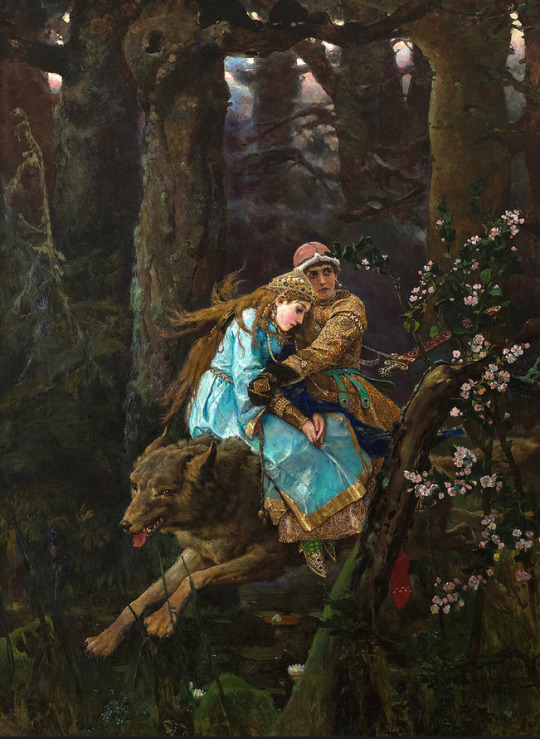
And it's just so????!
In my retelling of this fairytale, our hero is a bit of a simple boy. He is content with simple things and a simple life after his near-death at a young age to a mysterious wasting disease spreading across the land - a madness that robs the infected of sleep and appetite until they go insane. The only cure is the fruit of an equally mysterious tree. Ivan fears his healing may have not been complete, for he has not felt the need for sleep or food the way he ought to ever since.
When fruit begins to disappear from the closely protected tree, the threat of losing the cure drives Ivan into action. An enchantment of sleep shields the thief from being captured. Here, Ivan's curse is a boon, as he alone sees a great golden bird steal the fruit. Although a great company set out to capture the bird, Ivan becomes separated from them and lost. At an ancient crossroads that promises death in every direction, he meets the Wolf, the instrument of the crossroads' doom. When the Wolf unexpectedly takes Ivan to find his missing companions, they discover the whole company has fallen to the madness - Ivan's brother among them.
It is no disease, but a curse.
Ivan, now with the Wolf, seeks aid from his best friend, the Princess Evolett, who was to be wed to the prince of the neighboring country and seal a treaty of peace between them. But all is not as it seems in these foreign lands, and Ivan must work with the Wolf to capture the golden bird, protect the fruit tree, rescue Evolett, heal the madness, prevent war between the two kingdoms, and defeat a dark enchantment for good - if the Wolf, the madness, or a multitude of other enemies don't kill him first...
[ramble continued below the cut]
I love, love, love playing around with the fairytale motifs in this story.
For example, the original fairytale has a very episodic, repetitive sort of scavenger hunt that Ivan is forced into. I messed with it a lot to give the different elements their own, interconnected importance: the tree is a magical cure, the bird has magical elements of its own, the golden cage from some versions of the tale is a metaphor for the princess's imprisonment, the inns are not merely symbolism for laziness but traps laid by a powerful enemy to serve a dark purpose, and nothing is as it would seem - least of all Ivan or the Wolf.
The characteristics for Ivan specifically came to me while watching Mal in the first season of Netflix's Shadow and Bone.

I really love Mal's stubborn tenacity, fierce loyalty, and simplistic personal goals in the face of all the complexity and conniving of everything around him. Since this fairytale showcases a "simpleton" character, I wanted to show that character at their very best.
Also! I love writing Ivan and the Wolf. Ivan's plucky, irreverent sense of humor set against the Wolf's stoic, utterly dry and cold attitude is so much fun to play with. 👏
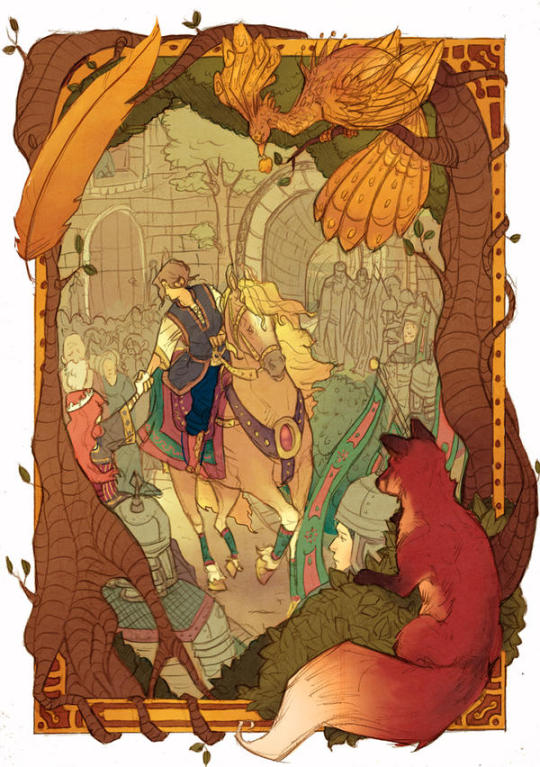

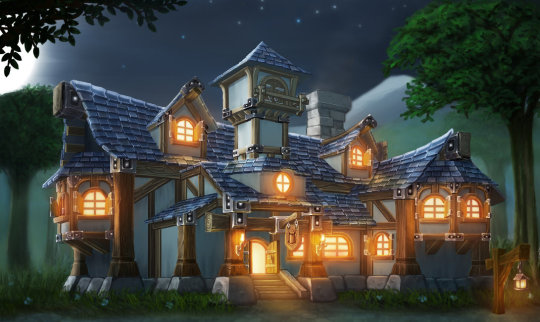
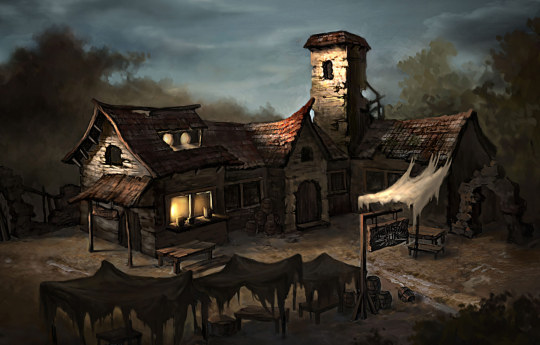
(tried to credit the images by link, not sure if that worked)
Excerpt from Ivan meeting the Wolf:
Then the wolf made a guttural, whining sound from the back of its throat, a sound which rolled forward out of its mouth and formed into four distinct words. "Will you kill me?"
Ivan stared at it.
Having never met a wolf before, he couldn’t say with absolute authority that they did not speak, but he also thought that if they had, someone might have mentioned it to him once upon a time. This one, however, most assuredly had spoken. He supposed he should have asked it to repeat itself, or even agreed with the sentiment and at once lifted his weapon. Instead, he considered the question posed to him. "I don't think so," he said in the end. "Not unless I have to.”
He didn’t add that this was because he didn’t think he could beat the wolf if he tried. There was something else at work here, as he had feared, and he needed to find out what the game was. In his head, he noted that this creature was not merely a wolf, but the Wolf.
The wolf made another noise, and this sounded like a quiet, “Ah, then.”
“What will you do if I come down?” Ivan ventured to ask.
The Wolf blinked lazily. “I have deprived you of your mount,” it stated. “I have come to take you where you must go.”
That didn’t sound promising, although slightly better than admitting it wanted to gobble him up.
“Are you fae?” Ivan called to it. He felt he remembered something from his father’s stories that the fae had to answer truthfully the questions you asked them directly.
“I am not.”
Enchanted or a liar, then. A wolf given the tongue of man. It also seemed to think something like a man, though its tone was distant and cold. “How can I trust you?” he asked it. The Wolf stared at him, not responding, and cocked its head. So maybe not the thinking of a man. Maybe the concept of trust was foreign to it still. He tried something less abstract. “Are you going to attack me?”
“That is not my purpose,” said the Wolf. “There is an inn, a long distance from here. You have strayed from the path and it took me some time to find you, but I can lead you there, through ways horse hooves cannot tread, before the Wood grows dark.”
“Is leading me to the inn your purpose?”
“It is.”
“Why?”
The Wolf had to think about this, and Ivan thought again that it didn’t seem to be comfortable with questions that involved reasoning beyond cold facts. “The crossroads demand a price from everyone who passes through them. The price is set by your choice and you have chosen. Now I will take you where your path leads.”
Yes, I'll take "uneasy partnerships founded on enmity but sealed in friendship" for $500, thank you.
A messy music playlist I haven't touched since NaNo writing: here
It's a story of family, loyalty, honor, and simple truths more powerful than any deep enchantment. 🥺😭
Excited to write Evolett more, she is a spitfire and impressed by no one (even when probably she should be, for her own good lol). Ivan's father was an adventurer in his own day, and I love writing little nods to his offstage capers - there's an invisibility cloak!
Ivan's brother is kind of a jerk. 🙈 But hey, still family. And he's less of a jerk than the guys in the old fairytale ok. 😅 Probably.
Ok, I feel like that's a pretty boring ramble, but I have tried to type this up about five different times so here we are! I have shed tears over Ivan and the Wolf, and lived in the nonsense from the random old woman running the dilapidated inn next to the one that breathes enchantment, and sketched out the borderlines between kingdoms and the unseen shadowy arm reaching across borders to ensnare them all, and written a lot of dog jokes. I love this one, I can't wait to get back into it. 😊
Thank you for asking and letting me ramble! 💛
#i have tried to type this up like five times#and it's been one of those weeks where i'm just constantly falling asleep#so we compromise and i stayed up so i will be falling asleep all day tomorrow at work instead lol#thanks for the ask!#kanerallels#wip: the madness and the golden bird
9 notes
·
View notes
Text
Inscryption wordplay through names, and the mystery of P03's name
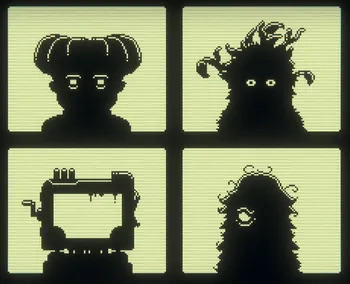
In Inscryption, the scrybes names are usually just nameified words to describe their area of expertise/what they are.
Grimora, wordplay on "grim", her field being death/mourning, + the "ora" to make it sound name-like. Maybe possibly a reference to grimm as in grimms fairytales? She does have an older theme/aesthetic with a quill for her main item, writing down the lives and tales of the dead.
Magnificus, play on "magnificent". Also alluding to magi/magic, maybe even the word magnus, all relating to the same root "magus" which means great and evolved to be used as a root word for magical words/terms.
Leshy is a bit different, as his name is literally just that of a forest creature in Russian/Slavic mythology. A leshy/i is a forest spirit/deity that lives and hunts forests. Apparently they also like the gamble and play cards too lol. There is also the noun "lesh", which means wool/hair (coming from the an old proto-albanian word for "foliage"), with a "y" added to nameify it. (a stretch I know but its neat)
P03 is the only one I don't know what his name is a play on. So I have a few of theories.
-It could be word jumble that vaguely relates to 3 letter computer/ tech related terms. Programs and parts with names like DOS, RAM,etc, or tech companies names like IBM or AOL. Even fictional computers like HAL follow this 3 letter naming convention, but none of these words relate too similarly to his name. The only possible 3 letter word that is similar is PSU (power supply unit), which could be in relation to his game mechanic, but it seems like a stretch.
- I also found for cars certain mechanical errors have similar name schemes. A P0300 error code means a misfiring cylinder, a P0030 means an oxygen sensor is malfunctioning. Maybe his name is an error code? We know that the old data seems to have corrupted the scribes, and P03 in some ways seems the worst off of the scrybes. He has locked his first personality away , as g0lly seems to be his original state , with his theme music reverting back to normal when he is playing as her. Even his appearance seems unkempt, with talk sprites body being dirty and scratched, and his screen is always twitching. So maybe his name is a mechanical error? However, if it is a mechanical in-world error, it doesn't really seem to effect him. He seems to have taken over the auto fill deck feature in ACTII (or maybe he is watching. Either way, he is monitoring this function) He can move to other scrybes islands and temporarily get rid of other scrybes when he wants (like with Magnificus). So it seems even all the way back in the "default" game of Act II he has a control over the game mechanics more than other scrybes. But if he does have more control over the game I don't understand why he would keep a mechanical error code for his name. It may also be a computer error code (like a 404) but those usually don't have letters in them. So dead end
- It does also look kind of like the name Poe but spelled in L33T (which is used in his cards), but the name doesn't seem to relate to him at all. The only thing I can think of is Edger Allen Poe, known for his dark and elaborate poetry. Ironic considering P03 is more concerned with game mechanics than story, to the point of annoyance. Maybe its an ironic jab, as it does seem through the Uberbots and his rant at the end of Act III that hints maybe deep down he wants to enjoy the stories he writes, but he's just to focused on the great transcendence to care. Anyways, probably not Poe then.
-The only possible lead may be a PoE, a "Power over Ethernet". It's an electrical connection which carries both internet and electrical power to a device. It relate to his awareness of the internet, as well as call to his motivation to escape to the online world.
Idk if I'm missing an obvious detail or if I'm overthinking this, but TLDR, in the base game P03's name does not fit with the other Scrybes in that it doesn't seem to allude to anything about his theme/personality. If anyone has some other ideas about this I'd love to know.
#analysis#inscryption#p03#leshy#grimora#magnificus#scrybe#idk i just feel like the other names have pretty simple meanings and bases#that its odd p03's name is so obtuse#it stands out i feel like there should be smthn more#idk i may just be being mentally ill on main again#whatever lol
33 notes
·
View notes
Text
The Yaga journal: The road to the otherworld

Baba Yaga as depicted in Mike Mignolia’s “Hellboy”
The first article of this journal was written by Natacha Rimasson-Fertin, and its full title is (when hastily translated by me): “The Baba Yaga on the road to the other world: a crucial meeting for the hero of the fairytale”. As I said previously, I will merely summarize the article and recap some of its important points.
Every reader of Russian fairytales is familiar with the famous chicken-legged isba, the home of the Baba Yaga. But where exactly this home is located is however quite unclear - its position seemingly changing from tale to tale. This article relies on the fairytales collected by Afanassiev to study the places typical of the fairy tales, the travel the hero must undergo to reach the hag, all to try to locate the mysterious but iconic lair of Baba Yaga - which, in hope, will help clarify her “true function and identity”.
It should be mentioned that, while the article focuses on tales about “travelling heroes”, it does mention the existence of another handful of tales where it is the Baba Yaga that invades the world of the humans - it is tales such as “Ivachka” (NRS 108-111) or “The wild geese” (NRS 113). [Note: NRS is the name used to refer to Afanassiev’s classification of Russian fairytales, the same way there is the ATU Index]. And in these tales, the house of the Baba Yaga is not actually located in the “otherworld”, but rather right next to where humans live: by a river side, or in the forest where the heroes regularly go fetch mushrooms. In fact, in these tales, the house of the Baba Yaga misses its chicken legs, and seems to be just a regular isba.
While the reasons for the quests of the heroes in Russian fairytales are varied and multiple, there is a general tendency: heroines usually seek to be set free from something, while the heroes either seek this same “deliverance” or actually seek a wife. In fairytales, space is organized by two oppositions: known and unknown, familiar and foreign/alien. In this context, as Propp highlighted, “the farytale is built around the hero moving in space” - so travel means the breaking of the order of things, and thus a journey is already something extraordinary. In russian fairytales, according to Tatiana Ščepanskaja (in her “The culture of the road in Northern Russia), the road is actually “outside of the divine order” and even opposes this divine order. Traditionally “the road is the world of the non-being, where the custom doesn’t work. By taking the road, the individual is out of the community, he escapes the world of social workings - there is punishment, no public pressure, but also no encouragment and no glory. On the road, one is alone and free, outside of community and its norms.” So the man who travels lose all status - he doesn’t belong to the human society, but to the “other world”. On the road, one leaves the protection of their ancestors behind, and open themselves to numerous dangers - this is why many heroes of Russian fairytales always ask the blessing of their parent before going on the road.
The road itself, as an “open space” is the world of all possibilities. In the last verson given by Afanassiev of the fairytale “Go I don’t know where, bring back I don’t know what” (NRS 212-215), the hero, after hearing that the Baba Yaga wants to eat him, mentions his status as a traveller “Why, you old devil! How could you eat a traveller? A traveller is bony and black, first heat up the tub and bathe me - then you’ll eat me!”. The bathing ritual itself is also a rite of passage.
The frontier of the otherworld is of various natures, depending on the tale. Usually it is a clearing in the woods, which forms a typical liminal space. The Baba Yaga is closely tied to forest, her house often being at the heart of the woods, which isolates her from the world of the men. On top of living in a deep wood, fear also forms a “circle” around the Baba Yaga, as she kills anyone that comes near her house and people avoid it - sometimes the forest even has additional obstacles, such as a deep pit, or a mountain.
In “Ilia of Mourom and the dragon” (NRS 310), we actually do not have a forest, but a mountain, forming a vast plateau. The hero needs to climb a very tall and very steep mountain made of sand - in order to go to the palace of the tsar whose daughter is harassed by a dragon. At the top of said mountain, the hero encounters not one but two Baba Yagas, who tell them how to reach their elder sister, and then the “Nightingale Robber”, whose whistling is so deafening it kills who hears it. The rest of the story seems to happen on the same plateau, since the hero is never said to go back down. The demultiplication of the Baba Yaga, turned into a trio of sisters, each older and more powerful than the next, and the presence of the Nightingale-Robber, embodiment of absolute evil and enemy of the Russian land, expands the “frontier of the otherworld” into a true no man’s land.
A similar phenomenon of “expansion of the liminal area” can also be found in the second version of “The feather of Finist, the fair falcon” (NRS 235), where the heroine has to walk into a deep and dark forest until iron slippers and an iron bonet are “worn out” - only then does she found a “small house made of lead, constantly turning around on chicken legs”. Sometimes the house is said to be found “beyond the three times nine countries, in the three-times-tenth kingdom, on the other side of the fire river” (Maria Morevna, NRS 159). As in the previous tale, the river of fire plays the role of a “last limit” between the world of the humans and the other world - and when Ivan returns, as the Baba Yaga finds herself deprived of her magical scarf, she burns in the flames.
The isba of the Baba Yaga has so many different descriptions that Vladimir Propp used it as the perfect illustration for his “Transformations of the fairytale”. Only two elements stay the same: the house is located near a forest, and has chicken legs. And even then, sometimes the chicken legs are replaced by other animal parts, such as “goat horns” in “Ivan the small bull”. In the second version of “The feather of Finist, the fair falcon” (NRS 235), the heroine finds a “little house of lead, on chicken legs, that was constantly spinning”. Propp explained that actually, the descriptions of the house constantly spinning on itself are oral deformations of what the house could originally do - turn on itself whenever it was commanded to. From “turning back”, the house simply started “turning”, until came the image of a house constantly spinning. In one of the seven versions of “The sea-tsar and Vassilissa the very wise” (NRS 224), the house is not described (”a small lonely isba”) and only two elements allow to identify it as the house of the “Baba Yaga with the bone-leg”. One is the dark, empty forest surrounding the house, and the second is the fact that when Ivan-son-of-merchant tells it “Small house, small house, turn your back to the forest, and turn you door towards me!” the house obeys and moves. And inside waits the Baba Yaga, her body going from one corner of the house to another, and her chest sagging to yet another part of the house.There is one particular case, the one of the NRS 141-142, “The brave Bear, Mustache, Hill and Oak”, in which the Baba Yaga and her daughters live in an underground world, with no mention of the isba.
But what happens inside this house, with this house? Propp did wonder, upon looking at the fairytales - why does the house needs to turn around for one to enter? It is true that Ivan finds himself in front of a wall “without windows or doors”, but why doesn’t he just go around the house, instead of telling it to turn? It seems to be forbidden to go around the house... The house seems to be on a frontier that Ivan cannot cross - one has to go through the house to pass, as it is impossible to cross otherwise. The open side of the house is usually turned towards the “three-times-tenth kingdom” that Ivan must reach, while the closed side is turned towards the realms Ivan comes from - Propp linked this with the Scandinavian custom of never having a door facing the north, because the house of Hel, goddess of the afterlife (Nastrand, the “beach of corpses”), had its door located towards the north. With this element, Propp concludes that the house of the Baba Yaga is actually the limit of the world of the dead - and crossing the house allows to “select” who passes and who doesn’t pass into the afterlife. Thus the meeting of the Baba Yaga is a trial in itself.
Propp sees in the chicken legs a remnant of the pillars on which stood the initiation-cabin, which seems to feed into this idea of the Baba Yaga’s isba being a rite of passage towards death. In his book about ancient Slavic paganism, Boris Rybakov mentions a type of malevolent undeads called the nav’i (nav’ in singular), who are the dead without baptism and that we must appease through offerings. He says that they appear like enormous birds, or feartherless roosters the size of eagles - they leave the footprints of a chicken, and attack pregnant women and children to drink their blood. These elements clearly evoke the myth of the Baba Yaga: is she one of those “wrongly-dead”, turned hostile towards humanity?

If we read the dialogue between the Baba Yaga and the hero of the tale, we understand better the trial that the Yaga is. In the tale “Ivan Bykovic” (NRS 137), Ivan-small-bull enters the “chicken-legged, goat-horned house”, and sees the Baba Yaga with her bone leg, laying on her stove, stretching from one corner of the house to another, her nose reaching the ceiling. She exclaims that up to this day she never smelled or saw a Russian man, but today she has one “rolling on my spoon, rolling in my maw”. Ivan answers “Hey, old woman, don’t get angry, come down from your stove and sit on the bench. Ask us where we are going, and I’ll answer you kindly.” The Baba Yaga has a similar dialogue to the heroine of the second version of “The feather of Finist, fair falcon” (NRS 234-235), but there she is less aggressive, probably because the maiden calls her tenderly “babusja”, “small grandmother”, to which the Yaga answers with affection “maljutka”, “little one”. These examples prove us that the heroes and heroines have to find the rights word to either intimidate or appease the Baba Yaga, to make her an auxiliary. For a male hero, it is courage that is put to the test, when it a female hero, it is politeness that needs to be used. But always, it transforms the Baba Yaga, from a guardian and an adversary, to a guide and auxliary.
In some tales, the Baba Yaga is much less aggressive, and is immediately a guide to the hero, and even shows some tenderness - like in the first version of the tale “The sea-tsar and Vassilissa the very-wise” (NRS 219-226) where she tells everything the hero needs to know for his quest, and calls him “ditjatko”, “my child”. This role of auxliary and guide is especially present in the tales where the hag is depicted as the mistress of the animals, or of the winds. For example in “The enchanted princess” (NRS 271-272), the hero, a soldier, uses a flying carpet to find where his fiancée is located. He visits successively three Baba Yagas, all sisters. The last one lives “at the end of the world”, in a small house beyond which there is only pitch-black darkness. Beyond the end of the world, there is nothing, the void. This last Baba Yaga is the ruler of all winds, and helps the soldier by summoning them - the south wind ends up revealed to the hero where he will find his bride.
However these are the tales where the stay at the Yaga’s house is brief. Other times, the hero has to stay for a long time at the house, and then the nature of the trial changes: the hero has to fight to keep their life. In “Maria Morevna” (NRS 159), the hero goes to Baba Yaga to obtain a magical horse able to rival the one of Kochtcheï-the-Immortal. The Baba Yaga agrees, but only if he serves her for three days - if he succeeds, he’ll have the horse, if he fails, she will place his head at the top of a pole. The hero manages to overcome the various imposed chores thanks to the help of animals he spared previously in the tale.
Another very interesting example is in the very famous fairytale, Vassilissa-the-very-beautiful (NRS 104), which is also the one where the house of the Baba Yaga is described in the more details - including the spikes covered in human skulls that Ivan Bilibine famously illustrated. After letting purposefully the fire go out in her house, Vassilissa’s wicked stepmother sends her fetch some fire at Baba Yaga’s house. Instead of being devoured, the heroine returns safely, and on top of that, this travel to the otherworld acts as a “reparation” - since justice is re-established through the deserved punishment of the wicked stepmother. The fire Vassilissa brings back destroys the wicked woman, reducing her to ashes. We should also note that, unlike in other tales, there is no need to ask for the house to turn, Vassilissa simply waits for the return of the Baba Yaga by the entrace gate. And on top of overcoming her fear, the girl is faced with much more complex tasks. The first is to do the house chores, but which are impossible by their enormous scope - however Vassilissa manages thanks to a magical doll and her mother’s blessing (the first being the manifestation of the second). The second trial is when the Baba Yaga has a discussion with the girl: she encourages Vassilissa to ask question, while warning her not to ask too much, because “not all questions are good to ask”. This is because the implicit taboo is to not ask the old woman about what is going on INSIDE her house. Vassilissa is victorious, because she knows when she should just observe - she doesn’t ask about the mysterious disembodied pair of hands working inside the house, but about the horsemen riding around the house, in the woods, and the Baba Yaga is very glad she asked about “only what was in the courtyard” - but, as some commentators noted, this is also perhaps the last trial because it is the only one that Vassilissa manages to overcome without the help of her magical doll. Once she saw what she had to saw, and overcame her fear, Vassilisa was initiated to typically feminine tasks of the patriarchal society - cleaning the house, preparing the meal, weaving... But this serves to actually fulfll her destiny - as in the second part of the tale, she arrives at an old woman who creates shirts, and the shirts she makes for the old woman are so good the tsar itself will summon Vassilissa and marry her, thus fulfilling the prophecy of her name (Vassilissa coming from the Greek “basileus”, “king”). The hero becomes a hero because they manage to perform the imposed task - these are “elective trials”.
Russian fairytales contain numerous other characters merely called “old women”, “hags” or “crones”, but that some elements associate with the Baba Yaga and the role of the “initiation-master”. Their old age, the fact they live in a house near the woods, and especially their way of speaking to the hero. We even meet a genderbent Baba Yaga in “ivan-of-the-bitch and the White Faun/Sylvan” (NRS 139) - an old man in a mortar, who pushed himself around with a pestle. Though this character’s behavior does not evoke the Baba Yaga at all.
With all of that being said, again the Baba Yaga is provent to be a deeply ambivalent character. Many different searchers provided many different explanations, but always ended up confronted by the contradictions that made her. According to the author of the article, the most pertinent theory would be the one of Anna-Natalya Malakhovskaya, who sees in Baba Yaga not just “an archaic mother-goddess in a world of good and evil dichotomy”, but rather a “goddess whose many roles fulfill the three functions of Dumezl”. That is to say, 1) wisdom and the link to the sacred, the magical divinities 2) the warrior function and 3) the fertility/fecundity function that is interwoven with death.
So... What sense should one give to these tales about a travel to the other world, to the afterlife, to the world of the dead? Beyond the entertaining nature of fairytales, is there an initiation in these tales? We can remember that Vassilissa the very beautiful, in her tale (NRS 104) is banished by Baba Yaga once she reveals to her the nature of her magical helper - when she speaks of the blessing of her mother, Baba Yaga tells her to leave the house, since she doesn’t want anyone blessed in her house. There seems to be something dadactic at work here - especially when we consider the virtues embodied by Vassilissa: piety (in the traditional sense, religious piety) and filial piety (as she stays faithful to the words of her mother), as well as docility, serviability, and bravery or rather trust. Trust in her mother’s blessing that even the all-powerful Baba Yaga cannot contradict. This last motif, of which the Vassilissa tale is the most emblematic example, highlights how the Baba Yaga is tied to archaid, pre-Christian concepts. We see here the tie to the protecting ancestor-spirits, through the mean of the mother’s blessing, which saves the heroine. This tale maybe illustrates the “double faith” so typical of the folk-Christianity of Russia.
Now, if we return to the tales evoked briefly at the top of the article - the ones where the hero doesn’t visit Baba Yaga’s home, but rather those where Baba Yaga invades our world to kidnap a child. How to explain the appearance of the witch in the world of the humans, either directly, or through intermediaries (the wild geese). If we look at “The wild geese” (NRS 113), we notice that the little brother is actually quite safe in the Baba Yaga’s house - he plays there with golden apples. What causes fear and trouble is the fact that he was kidnapped, more than where he stays. The disturbance in the order comes from the ravishing - and the girl is worried that she will be punished for to not having watched over her brother well enough. It seems here that the appearance of the sinster Baba Yaga, or of her winged servants the wild geese, is here bringing an answer to the phenomenon that reason refused to explain - in this case infant mortality. These “wild geese” that “ravish little childrens” might be agents of death.
In conclusion, the Baba Yaga is at the same time the guardian of the frontier to the other world, but also the ferryman (or ferrywoman) leading to it, the guide to this other place - for she is a liminal being between the world, half-living, half-dead, half-animal, half-human. It seems that layers and layers of cultural meanings, symbolism and interpretations have accumulated themselves onto the Baba Yaga more than on any fairytale character, resulting in a complex and tangled knot creating a divinity as spiritual as chtonic, ruling over the fate of mortals.
As for the geography of the fairytales, we can clearly have a three-part map with the Baba Yaga tales: our world, the other world, and the in-between-world. In the in-between world, passage can go either way. Under the aspect of simple, entertaining stories, these tales are initiation rites, describing through images and pictures the changes happening when one “passes” into the adult age, as much on an individual level as on a social one.
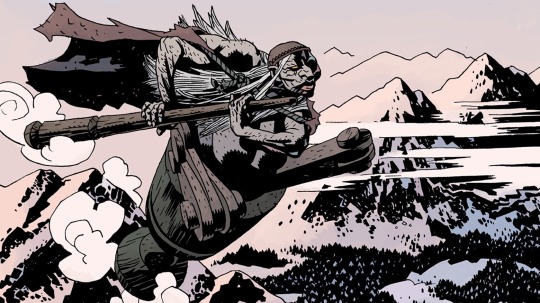
24 notes
·
View notes
Text
Given people tend to have a short-lived memory on the Internet, let's recall together one of the ridiculous moments of Putin's Russia's propaganda against Europe. It is something that happened very recently, and for once it is not an ideological or social conflict or propaganda. No, it is a meteorological one - a story that might seem laughable and absurd, just a good joke on its own, but a story that shows us how deeply buried in lies and falseness and a complete detachment from reality the Russian propaganda is. This highlights the sad truth of how Russian media became a mass-fake-news machine and is ready to twist and turn every little fact of life to serve their own "Russia is the greatest, the rest of the world is Hell" view.
This happened in the winter of 2022-2023. If you are not in Europe maybe you didn't hear about this, but it was all over here. If you do not recall, this winter was actually colder than the one of previous years - which notably caused a certain problem because there was an economic crisis going on thanks to the Ukrainian war. There is this big price inflation all across Europe, coupled with the fact we don't get the Russian oil and gaz anymore - and this slightly colder weather mixed with the more costly every day life and the lack of heating fuels were all used by Russian propagandist to announce that Europe was going to face its harshest and coldest winter yet, and that thanks to the Ukrainian war, they would all freeze to death. If you listened to the words of Russian information channels, it was as if ASOIAF's "Winter is coming" was happening in real life.
Putin notably used a sentence referring a very popular Russian fairytale (though it is actually a folktale also heavily present in Europe, especially in France where it is part of the Roman de Renart) - "The wolf's tail will freeze". For Putin, Europe was the wicked and greedy wolf, and this harsh icey winter would weaken Europe the same way the wolf who was tricked into fishing with his tail got trapped in the lake of ice...
Let's begin with a "little lie", well a big one, but still lesser compared to the others that follow in this post. Mid-March, Olga Skabeyeva (one of the famous propagandist news anchors of Russia) claimed that due to the rise of prices, a third of the inhabitants of France was forced to give up on hygiene and beauty products. According to her, a third of French people didn't use shampoo or deodorants anymore, a third of French people didn't clean their teeth anymore - they even had to abandon toilet paper due to it costing too much! And of course, Skabeyeva concluded that this was all because France gave too much money to Ukraine, leaving its own people "poor and dirty"... Note that this actually plays on a widespread stereotype French have among foreigners: the reputation of French being dirty for only taking a bath once a week or so. I don't know where this stereotype of the French that doesn't take care of their personal hygiene comes from, but it exists.
If you are from Britain, you probably heard about Olga Skabeyeva's famous comments about the poor state the harsh winter and economic crisis of England had left people into. Mid-January she affirmed on Russian television that the common British folks were forced to eat dog food and cat food because human food was too costly, and that now English households cooked on their radiators, since they could only afford one heater for the whole house. This was backed up in early March by her claims that British restaurants, due to a lack of animal meat, were forced to serve squirrels to their clients, and that they would go on to trap other animals found in parks. Many British people argued back that yes, there was a big and harsh crisis, but no it wasn't as bad as the propagandist claimed and no, nobody ate squirrels in restaurants. [I unfortunately cannot find back the source but I recall seeing around the time this made the news, that the propagandist actually took one true info - something about indeed people killing squirrels somewhere in England for health and ecological reasons, or maybe some public figure joking about possibly eating squirrels - and then twisted it into "all British restaurants serve squirrels now". That's typical of propagandists - take one grain of truth, make it a whole beach of lies.]
And then we reach Germany. This time I have sources to back up, exact sources I will bring to you. In fact, if you want to know more about the crazy world of Russian propaganda, I can't advise you enough to check out this very informative and eye-opening series: Arte's Fake News. Arte is a Franco-German binational channel that brought this program - originally a web-series, that also aired on television. "Fake News", of its full title, "Fake News: Russian propaganda for beginners", is a series created and hosted by Marsha Borzunova, the representative of a group of anti-Putin Russian journalists that exiled themselves. Now, from the town of Riga, she and her crew created these videos that study, debunk and explain the various aspects of Russia's propaganda.
And one of her videos covered the topic of "European winter as seen by Russia". She talked of Putin's "wolf's tail" comment, she talked of how Russian television channels claimed that Czech figureheads publically said that to survive winter they will burn "everything they get their hands on", and even burn Ukraine down... And she also brought up the "Berlin problem". During the last months of the year 2022, Russian newspaper multiplied reports that due to the lack of oil/gaz and the extreme temperatures of winter, Berliners were cutting down almost all of the trees in their public parks. Which of course, is something that never happened. But these newspapers listed an American article from Bloomberg as their sources - and when you go look at the article, you realize how heavily the propagandists twisted the original words. The Bloomberg article was about the energy crisis in Germany, indeed, and how wood-fueled heating systems were now preferred and demanded over gaz-fueled heating systems, but that was it. The article did mention public park trees being cut down as an example... as an HISTORICAL example. The article speaks of the cutting of the Tiergarten trees in WORLD WAR II!!!
To add salt to the wound, there is the existence of a television show in Russia called "Antifake", designed to debunk fake news and denounce propaganda. Not Russian one though - the point of this show is to destroy the "lies of the West" and reveal the "truth" about Europe. Which is, as you can guess, a pile of absurd and shameless lies in favor of Russia. Antifake most notably fed into the whole "Europeans are freezing to death" thing by having their reporter living in Germany, a woman called Yulia, do a live interview from her apartment in Munich - and she appeared in this interview wrapped into a big, heavy winter coat, fur-lined hood over her head, despite being inside. Because, as she explained, the furnace had been cut for the night and in the morning, and so she was waiting for noon to have the sun heat her apartment into a more bearable temperature. An interview that becomes absolutely ridiculous when you know that at the same time, in Munich (Yulia's town), it was mid-october, it was a sunny week with 18 degrees outside (I'll let you do the conversion if you are American). Nobody in their right mind was wearing a coat inside their house, and nobody wore heavy coats outside either, and there was no furnace cuts. Even more hilarious is the fact that the emission showed background videos recorded of European heavly clothed, sharing food at some charity stand in a freezing morning... Except that when you look at the signs in this supposedly "German sight", you see everything is written in cyrillic, and that's because these images were recorded in the town of Opotchka, in the Pskov region, not "near Berlin" as they wanted the audience to think. Speaking of Yulia - you might have heard of her outside of the "Antifake" show, because she made herself quite famous in Germany, even viral. She went viral because she posted a video of herself smiling and dancing with a Russian flag... In front of a group of Ukrainian refugees in Salzburg. She became known as the "Russian harasser of Ukrainians fleeing the war" in Germany.
Borzunova also mentions the cyber-war of fake news to conclude her look at Russian's fantasies about a winter of misery in Europe: on Twitter, there was a trend that spread, a hastag #AgainstSanctions. This hashtag was shared and posted by many Europeans of various countries, complaining that the sanctions taken against Russia were ruining their life. The trend was simple: post a picture of an empty plate, with a message written on a piece of paper onto the plate, directly demanding to your local politician to stop the anti-Russia sanctions.
Here's the thing however: this "trend" was reported by Russian institutions and medias. And while the posts of this hashtag do exist, when you look just a little bit deeper you realize how fake it all is. All the accounts that started this trend only have one post in total: the AntiSanctions post. All these accounts were created on the same day. AND their profile pictures are those of public figures - ranging from CNN news anchors to Bollywood actresses.
Anyway, if you want to check the video about all of this, you can go look at it on Youtube. I personally watched the French subtitled version, even though there is a German-subtitled one (thanks to Arte being Franco-German), and Borzunova speaks in English, so you can still listen to her comments and understand her explanations without reading French or German:
youtube
If the video above doesn't appear, here is the link.
#russian propaganda#russia#fake news#putin's propaganda#europe through the eyes of russians#russian propaganda for beginners#Youtube
16 notes
·
View notes
Text
Stay I Pray You
read it on AO3 at https://ift.tt/3pAOkXB
by lost_my_glasses
“The Blacks took everything and gave nothing...but that doesn't excuse the slaughter of children for their parents sins. Regulus did not get a happy ending. But we will.”
· ─────── ·𖥸· ─────── ·
The Russian Revolution brought about the fall of the Black Dynasty, and the execution of its surviving family. As Russian officials crack down on the country, struggling citizens spread a rumor that could result in their execution; that the youngest Black, the Grand Duke Regulus, still lives.
Six years after the fall of the Black family, two young conmen, James and Remus, have conjured up a plot to get them out of Soviet Russia—for good. Attempting to forge a fairytale the whole world will believe, luck would have it that a young orphan is also seeking a way out of Russia, and looks just like the missing Grand Duke.
· ─────── ·𖥸· ─────── ·
A Marauders Era Anastasia AU featuring far too many politics and historical references
Words: 2873, Chapters: 1/?, Language: English
Fandoms: Harry Potter - J. K. Rowling, Anastasia (1997), Anastasia (1956)
Rating: Teen And Up Audiences
Warnings: Creator Chose Not To Use Archive Warnings
Categories: F/F, M/M
Characters: James Potter, Regulus Black, Sirius Black, Bellatrix Black Lestrange, Andromeda Black Tonks, Narcissa Black Malfoy, Walburga Black, Orion Black, Lily Evans Potter, Remus Lupin, Marlene McKinnon, Dorcas Meadowes
Relationships: Regulus Black/James Potter, Regulus Black & Sirius Black & Bellatrix Lestrange & Narcissa Malfoy & Andromeda Tonks, Regulus Black & Sirius Black, Sirius Black & Remus Lupin, Remus Lupin & James Potter, Marlene McKinnon/Dorcas Meadowes
Additional Tags: Inspired by Anastasia (1997 & Broadway), Alternate Universe - Anastasia (1997 & Broadway) Fusion, Memory Loss, Angst, Angst with a Happy Ending, Implied/Referenced Child Abuse, Idiots in Love, Hurt/Comfort, Regulus Black Needs a Hug, Implied/Referenced Character Death, Everyone Is Gay, Everyone Needs A Hug, Everyone Gets A Hug
read it on AO3 at https://ift.tt/3pAOkXB
3 notes
·
View notes
Text
The Creatures of Yuletide: Grandfather Frost, the Soviet Santa Claus
Grandfather Frost, or Ded Moroz, is a very peculiar character. Even with Soviet Union authorities looking down on Christmas traditions as pure bourgeois and religious propaganda, and initially looking down on him too for the same reasons, he rose in prominence as a symbol of the New Year festivities meant to replace Christmas and is to this day a symbol of Slavic holidays.

Grandfather Frost started his life as a snow demon in Slavic folklore, however, it's worth pointing out that before Christianity arrived the term had no negative connotations.
He was also called Morozko or Ded, and in this form, he appears in Russian Fairy Tales, a collection of tales collected by Alexander Afanasyev. In the story Morozko, or Father Frost, a little girl is abandoned by her wicked stepmother to die in the woods during the winter. Father Frost finds her there, and because the girl is polite and kind to him, he gives her a chest full of beautiful jewels and fine garments. When the greedy stepmother tries to do the same with her daughter in hopes the girl can get the same reward as her stepsister, Father Frost freezes her to death at the foot of the tree and carries her body back to her grief-stricken mother.

Some tales suggest he would kidnap children, and only return them when their parents provided him with gifts.
The character is from pre-Christian times, but under the Russian Orthodox Church, he was transformed.
By the end of the 19th century, Father Frost was a very popular character, appearing in operas and plays, but after the Soviet Revolution, by 1928, Soviet authorities declared Ded Moroz was "an ally of the priest and kulak",
On December 28, 1935, Pavel Postyshev, a Communist Party publicist and member of Joseph Stalin's inner circle, published a letter in Pravda, the official newspaper of the Communist Party of the Soviet Union, in which he proposed to give Soviet children a return to “the atmosphere of fairytale and magic.” While the winter festival was rehabilitated, all religious references were removed. New Year's instead of Christmas became the main holiday, and Grandfather Frost became its symbol.
In 1998, the town of Veliky Ustyug in Vologda Oblast, Russia was declared the home of the Russian Ded Moroz by Yury Luzhkov, then Mayor of Moscow.
Now we need to talk about Snegurochka, the Snow Maiden, his granddaughter, and helper. She's inspired by a tragic character in Slavic fairy tales from the 19th century, where a snow doll comes to life and wants to experience the human world, only to end up melting as consequence.
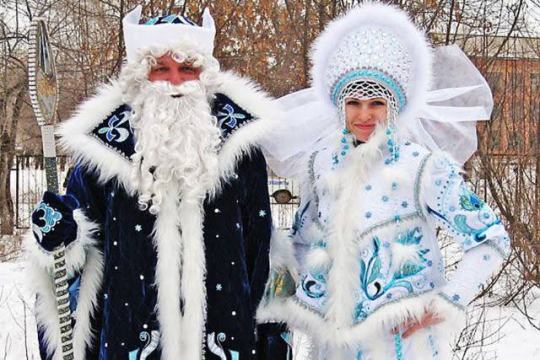
In the play The Snow Maiden by Alexander Ostrovsky, she is the daughter of Ded Moroz and Весна-Красна, Spring Beauty. She wants to leave her parents behind and live in the human world, and her parents allow her to live as a peasant, arranging an adoption by two peasant parents. There she grows to like a shepherd named Lel, but her heart is unable to know love. Her mother takes pity and gives her this ability, but as soon as she falls in love, her heart warms and she melts.
Later this tale was adapted into an opera by Nikolai Rimsky-Korsakov.
And here's a Russian stop-motion adaptation of the story I found online.
youtube
In the late Russian Empire, Snegurochka was part of the Christmas celebrations, in the form of figurines to decorate the fir trees and as a character in children's pieces. When the New Year's celebration was allowed in 1935, she was included.
Usually, former members of the URSS had their variations of Grandfather Frost and the Snow Maiden. After the Soviet Union Collapsed in the early 1990s, people returned to their old customs. Today, Ded Moroz is mostly celebrated in Russia, having gone out of fashion in other countries. Ukraine seems to have shifted from Ded Moroz back to St. Nicholas. There were rumors that Ded Moroz imagery was discouraged by the authorities due to conflict with Russia, but the Ukrainian Ministry of Culture refuted this
@natache @ariel-seagull-wings @thealmightyemprex
34 notes
·
View notes
Note
Hi! Just preemptively, because I'm sure running this blog can be exhausting: this ask is about whether a half-baked idea I had for cover art of Lolita as a teenager has ever been used on a real book cover-- nothing heavier than that.
So! The Kubrick movie was so bad that as an adult I turned it off 10 minutes in, but I watched the whole thing when I was 17. I don't remember exactly what Dolores' "Midsummer Night's Dream" costume looked like, but it must have had a bunch of leaves/forest debris glued onto the shoulder, because I was very taken with the idea of creating an image where she's in the costume and HH looks normal/is gripping her shoulder, but when you take a closer look instead of a hand he has a talon digging into her shoulder, slightly camouflaged by all the woodland stuff on the costume but readily apparent if you look at Dolores for more than half a second. when I tried watching it as an adult I turned it off after about 10 minutes, but as a teen, I thought a great way to depict the threat of HH lurking in plain sight/barely obscured would be to have him clutching Dolores' shoulder while she's still in the costume for "A Midsummer Night's Dream"-- only instead of a hand, he has a talon digging into her shoulder, slightly camouflaged by the woodland debris on Dolores' costume but easily spotted if you look with even the slightest bit of attention.
Nowadays, I don't support that imagery for the story-- HH's real hand on a real child is far more horrifying, I agree with Nobokov abt how images of Dolores shouldn't be on covers, etc-- but I was wondering if you've found any similar imagery over the course of your research?
(Literally just curious though, so no worries about answering if for whatever reason you don't feel like it. Thanks for sharing such great analysis on here, and best wishes on your thesis!)
Hi! Thank you for the lovely message and the concern - though honestly this blog is helping as a sort of vent space for what I have to work through for my thesis anyway.
I have not seen any cover resembling your old idea! I have actually barely seen any cover that leans into the fairytale aesthetic despite that being a strong recurring motif even outside of the "Enchanted Hunter" play/hotel. There MIGHT be some out there that combine the popular butterfly motif with the little girl and end up making her look like a bit of a fairy but I can't find any right now.
This might come closest to what you described in spirit, though it is not a cover but a flyleaf from a Russian edition that I can't actually find the cover of.

More vaguely interesting editions under the cut
Theres this 2009 Russian edition but Humbert doesn't appear on it and there is no subversion of the romantic imagery

This 1987 German cover for the Enchanter (not technically Lolita) has that aspect of Humbert as a (decidedly human though) monster but it's missing the fairytale aspect:

This Russian edition goes full literal nymph but, again, we are not subverting anything and this is definitely not a costumed little girl but an actual magic creature

Russia again, 2000, (interesting pattern) but this is a costumed little girl, though without Humbert and not her movie costume. Might also be a child bride, not a reference to the play.

Ukrainian. Humbert's "talons" prominently featured. Might have had some impact if Dolly's dress wasn't transparent for some godforsaken reason.


These are the ones with the closest vibes that I've come across. And while you're right in that it's not ideal wrt making Humbert a literal monster that obscures how human he is and featuring a little girl prominently I do think cover artists could do something by leaning into the fairy tale thing in some way. If we allow ourselves the leeway of featuring body parts there might also be something with just showing Dolly's shoulder and Humbert's hand resting on it, fatherly at first glance but digging into her skin and holding her tightly when you look closer. God knows, I'm no illustrator but there are so many options I'd love to see more. Also Stanley Kubrick rot in hell <3
5 notes
·
View notes
Note
“The Phoenix is a mythical Greek bird often referred to as a Firebird”
“Firebird (Classification) Firebirds, also called Phoenixes, come in many shapes and sizes, and can be found around the world.”
We can all copy and paste from online websites to prove a point.
As for the rest of your rant, I have no idea what you’re taking about. I left you one comment highlighting all the Lucien and Vassa hints, as I was interested in your POV, but your reply to me was irate and kinda rude (so I wrote a lengthy rebuttal in response - purely out of the merit of debating). I didn’t call you a high schooler, I have no idea where you got that from ?
And sure, this is your blog. But your blog doesn’t exist in a vacuum - you are posting your opinions on an online, public platform using hashtags, meaning that it will be seen by other tumblr users. I found your blog because of your anti-Vassien posts, stuff like this; “He and Jesminda were an inferno while Vassa would feel like a lukewarm bath in comparison.” (As if we even know anything about Jesminda?).
It seems like you post a lot of antagonistic stuff yourself (literally the top photo is mocking elriel shippers with a juvenile buzz light year gif, saying there’s “no sign of intelligent life” lmao). A quick scroll shows that you’re not afraid to enter the spaces of other ships and reply to their stuff, telling them how they’re wrong (despite you saying in your recent reply to me, that you don’t see the point in debating with people who have opposing ships to you ???)
And tbh the fact that you’re confusing me with someone else who is calling you a highschooler, or whatever else - speaks to this. If your blog was purely pro-elucien content, and people came into your asks just to shit on elucien - that makes them the assholes. But if you’re posting stuff publicly that shits on other people’s ships (as you do), as much as it’s your right to do so, you can surely expect people to take issue with what you’re saying, and debate you on it. Which again, is literally what you do to other people.
I’m not “angry” at your blog - you’re just getting back the same energy that you put out.
You can copy and paste all you'd like from the internet however, Vassa is not a phoenix so in this case your selection isn't valid.
Firebirds belong to Russian / Slavic folklore while Phoenix belongs to many cultures. To proclaim they are one in the same means you're trying to lump all cultures into one.
You're searching for any possible way to try and tie your Lucien / Vassa theory belonging in Day together while ignoring what we know of her curse.
The fairytale revolves around Koschei and the FIREBIRD. Which is not ever noted as Koschei and the Phoenix.
She was cursed and wants to break the spell. What about what she's going through makes you believe she wants to continue turning into a bird and requires the sunshine of Day to do so?
Energy I'm putting out there? You mean the energy I share with my followers under the Elucien, Anti E/riel tags? The energy where I'm not seeking out E/riel or Vassien fans and starting arguments with them? You saw my posts in the Anti Vassien tag yet you thought it would be a great idea to start an argument? Because you're triggered by my stance? Are you saying I'm not allowed to think "Lucien and Vassa would have lukewarm chemistry?"
As far as the intelligent life post, did you happen to note who it was aimed at? Was it everyone who shipped E/riel or was it at Anti Lucien's who eviscerate him because he had never even met Elain but wanted to meet her once to know if he should try to fight for her while she was in love and engaged to someone else? Then those same people turn around and ridicule Elucien's for shipping them. So yeah again, people that throw the first insults are going to find that their targets fight back.
You and I are not the same because again, I am sharing my content under the correct tag letting people know which side I fall on and am not baiting people or entering their blogs to start things. My mutuals and I deserve to address the bullying and flat out twisting of facts that occur in this fandom in a space that was created using proper tags.
YOU are the one actively searching out accounts that you don't agree with and hiding your identity while trying to start something. And it's interesting you claim you're not the Anon from earlier yet I have never received Vassien shipper anons back to back on the same day. In fact it's rare that I have any Vassien shippers message me 🤔
8 notes
·
View notes